#it’s the way her arc is not about redemption or forgiveness
Text
My honest opinion of the story expansion (all the good and the bad)

Hi everyone, remember that this is just a personal opinion and it doesn't mean that everyone should have the same opinion.
-I love Cyrax's maturity and his redemption SHE IS SO CUTE 💕.
-One of the things I didn't like was that Cyrax and Kuai Liang were ex-couples, because in the story there was not a single dialogue that touched on that subject, only that they have known each other for years, it is not even mentioned that they were close, if it were not for the dialogues, the fact that Kuai Liang would have killed her if it were not for Harumi who stopped him. They had the whole story to be able to explain it and not even at the end we are given a hint of their past. It literally seems like a poorly made ship by Dominic for nothing more than doing it.
-Something I liked were the faces of my babies
-They changed the sex of Sektor and Cyrax just to ship them with the brothers, Honestly I felt that way, everything was very forced.



-If there's one thing I can't forgive is that Tomas didn't have a single chapter of the story and it appeared only at the beginning, when there could be so many possibilities that he would have a chapter with the theme of the multiverse, or having accompanied Kuai Liang. Also, wasn't he holding back Bi Han and Sektor? They're wasting a character that has potential.

-About Bihan and Sektor, the truth is that I have mixed feelings about this ship. As Kenshi says, they are made for each other. The bad thing about this is that both of them increase their ambition, deep down they cannot redeem themselves. I find it nice how Sektor loves Bihan despite everything that happened, since she is the only person who stayed by his side.
-Tanya and Rain were a really cute couple but they kill rain already ( one of the few couples that I like)

-And this is something UNFORGIVABLE ABOUT BI HAN NOT HAVING BEEN REDEEMED, I mean, they had everything for him to have his redemption arc, however, when he became Noob Saibot they showed him as egocentric as never before and immature. You don't know how angry it made me. The only hope it gave me was that he stayed in the temple of the Elementis, but Sektor took him out, and Bi han asked to stay as he was. Even though his mind remained intact, I still think that something different remained in him.
-And not to mention the final battle against Havick, he was defeated by Bi Han and then Geras froze him, I felt like everything ended suddenly. I thought there was going to be a final battle,This expansion was very short
-Honestly, as always, I loved Liu Kang throughout the story, after everything Bi Han did to him, he still wanted to help him.
-In the end Bi has remained as before but being Noob Saibot
-The story was really weak and quite predictable.
Mi conclusion final;
Dominic had every opportunity to make a good story but he ruined it, he had good characters, good origins, he knew what the fans wanted but it seemed like he didn't care, you don't know how angry it makes me
34 notes
·
View notes
Text


Daisy Tonner you complicated weirdo. I think about you everyday
#tma#the magnus archives#daisy tonner#she makes me crazy you guys donnnt#you don’t UNDERSTANDDDD#it’s the way her arc is not about redemption or forgiveness#but trying to better herself because it’s the right thing to do for herself#AND for the people around her#I start crying if I think about it too long
36 notes
·
View notes
Text
I think my most controversial saw-opinion (okay, one of them) is that I don't like the idea of adam and amanda being best buds?? it's hard to explain in a way that doesn't make me sound like a "but what about ME?!" type person, but anyway--
it's weird, because the way I see adam as a character, he WOULD most likely forgive amanda, even if he dies (even AFTER he dies!!) bc despite me not really liking it, it still feels in-character for him, y'know?
meanwhile I feel like I'm on the sidelines all "adam noooo, if you're gonna forgive her, AT LEAST be mad at her about it first! I KNOW you've got a spine somewhere, so sHOW IT, DUDE!!!!!"
#saw#dgmw I love amanda too and I love forgiveness/redemption-arcs#but for me- amanda feeling bad about killing adam isn't enough to absolve her of All That. there needs to be more catharsis#there was nothing but herself stopping her from just letting him out instead#i know she's got issues of many kinds but still. girl wtf#anyway- back to what I was actually talking about:#reading SNK hurt me for life in the way I perceive forgiveness in media unfortunately#so if adam's gonna forgive amanda I at least want him to be angry at her first.. [king harkanian voice] “THEN we can talk about mercy”#don't jump on my ass for this btw. it's just my onion
1 note
·
View note
Text
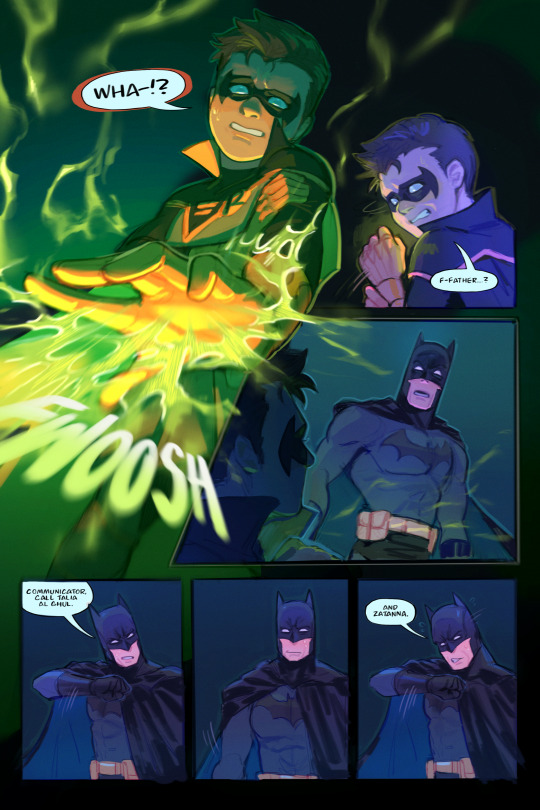
spontaneous magic manifestation was NOT mentioned in the parenting handbook 😬
I know this isn’t how magic in dc works, but the fact that Damian’s ancestry includes some pretty powerful magic users is… INTERESTING 🤔? Drabble under the cut!
I wanna preface that I'M NOT SAYIN' that Damian should/does have magic powers, but there’s still so much unexplored potential with Damian's character, and the thought that he has a dormant adeptness in magic is somewhat compelling to me. Most importantly it would FREAK! BRUCE! OUT!!!!! What is this, magic puberty 😭??
By DC laws, anyone has the ability to learn magic, but it is also possible to be an innate ability. The Al Ghuls are no strangers to the occult-- Ra's has had increasingly been portrayed as a magic user, and the recent establishment of his mother being a sorceress/witch?? Even Talia dabbled in a bit of magic, I think. There is a catch that their power is suggested to be due to Lazarus exposure, but for arguments sake let's say the Al Ghul lineage is inherently proficient in magic (and Lazarus exposure simply enhances it).
I can't recall "magic" being a part of Damian's training/upbringing (I'm still slowly catching-up on Damian comics so apologies if I miss any canon examples of magic use). Not sure why Talia wouldn't want her little "heir to an ancient assassin empire baby" to learn magic, but it would at least give reason to Damian not knowing about his magic potential, or lack of interest in it.
Through the power of pseudo storytelling, what if Damian's encounter with Mother Soul could have triggered a manifestation of magic that was once dormant; like a pressure cooker waiting to explode with energy when it hasn't been given a safe outlet.
I've yet to read a satisfying arc where Damian truly gets to contemplate his Al Ghul roots outside of "dad is good guy, mum is bad guy". Damian's initial character growth stems from him running away from, and renouncing his association with the League (i.e. "I'm nothing like you, mother and grandfather!").
The most recent thing I've read was Robin (2021), and whilst Damian is much more cordial with his mother, there's still an emotional distance and sense of distrust/resentment (for good reason, even if the context was some cartoonishly evil writing). But there is a silver-lining that they still appear to be fond of each other, in a melancholy kind of way.
Realizing he's "genetically" primed for magic would be especially confronting to Damian. There's no denying his Al Ghul blood, forcing him to confront a facet of himself he can no longer ignore or reject. A family that he likely has to approach for help/guidance.
Damian is put in a position of acknowledging this power could be used for good, to be stronger, to fight crime, balancing it with the implication that what he possesses could be rooted in dark magic (Lazarus enchantment).
If he decides to embrace it, would that be too much of an endorsement of the Al Ghul's dark occultism? Can he separate the two ideas? What if he can't control it? What if he accidentally hurts someone? What if has the ability to save someone where his other skills fall short?
Ideally, I'd love for this hypothetical story to lead into Damian exploring his Al Ghul heritage more intimately, historically, and spiritually (à la RSoB: Year of Redemption adventures). Another little coming-of-age self discovery journey.
I have my own little personal thoughts on what Damian decides to do with his magic powers, but I'd like to leave that open to interpretation... By the end of it I hope that he will at least find some forgiveness over resentment, and a balance between accepting that side of his family a little easier. It is finally a sense of inner peace :)
Any thoughts? Did I get any characterisation wrong? Let's talk over on my DC blog @arkhamochi! I'm currently trying to read all Damian-centric comics until I catch up with the current run. I'm hungry for discussion and analysis!!!!!!
#batman#batman and robin#damian wayne#bruce wayne#dc comics#P.S. drabble is kinda LONG so DO NOT read more unless you want the inconvenience of scrolling
4K notes
·
View notes
Text
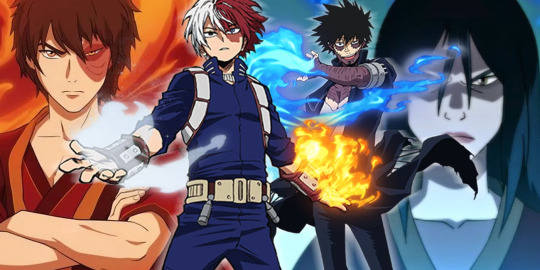
DOOMED SIBLINGS: THE TODOROKIS VS. THE FIRE NATION ROYAL FAMILY
I received an ask in my inbox about how Zuko doesn't owe Azula any forgiveness. Truthfully I wasn't even going to respond because this isn't an avatar blog, but then I watched this video.
Not only do I disagree with the basically everything in this video, but I am going to make the argument that both Zuko' and Azula's arcs are both incomplete with the way the show left the two of them in the final showdown.
In order to make my argument I'm going to compare Azula and Zuko's relationship in avatar to Shoto and Toya's relationship in My Hero Academia and use the latter as a more positive example.
Unnecessary Redemption Arcs
The common fandom opinion I want to argue against is this idea that Azula's ending is a perfect tragedy, and therefore doesn't need to be expanded upon. There's also a sentiment that redeeming Azula would somehow ruin the impact of this perfect tragedy.
I'm about to argue against both of these points.
Azula's arc doesn't work as a tragedy.
Because of this her arc is unsatisfying and unfinished.
I'm going to address the first bullet point but before that let me add another disclaimer. The reason why I think Azula's arc isn't an effectively written tragedy isn't because I like Azula.
Before we even get into the My Hero Academia comparison let me bring up something completely different. I do like Azula, but I like Terra Markov from Teen Titans a lot more and I would not change a thing about her tragic end.
AZULA'S ARC IS NOT A WELL-WRITTEN TRAGEDY
Terra in the comics is what a lot of people accuse Azula of being. She is stated in the text and by her creators to be an unfeeling sociopath. She was also never intended by her creators to be redeemed.
[About Terra] The very first time we see her, she’s trying to blow up the Statue of Liberty. It’s just that all the fans assumed because we went out of our way to make her cute — but not too cute, with the buck teeth and everything — everyone would assume that she was gonna become good by the end and that was never the case.
First thing, we made a promise that day that we would never renege on our view that she’d never become good. It’s sometimes hard to do that with characters you like. You want them to become good or something like that. But we never liked the character enough—because we knew what we were doing with her—we never allowed ourselves to fall for the character. Because that’s bad. That’s bad storytelling. You’re doing what you want as a fan at that particular point, not as the creators. T
Now let me clarify, both creators of New Teen Titans say some nasty things about Terra and don't recognize her sexual abuse, but here's the thing. You don't have to read a story 100% the way the author intended, sometimes the story says one thing and the text says something different.
I am going to use Judas Contract as an example of a story where the character from the start was never intended to be redeemed and why that's a positive in this case.
Terra is a teenage girl, the bastard daughter of the king of Markovia and a random American woman who presumably has had no stable home her entire life because she's working as a mercenary at fifteen. She teams up with a man that is in his mid fifties and even starts a sexual relationship with him (this is statutory rape she cannot consent) and Deathstroke uses her to infiltrate the Teen Titans and learn as much as possible.
Terra is sent to live with the team and spy on them for several months. The whole time she only ever engages with them in a fake spunky persona, and never shows her real cutthroat self. She leads Beast Boy on in a fake romance to make him trust her and secure her place on the team. The way you'd usually expect this arc to go is that Terra would grow fond of the team and be torn in her loyalties.
Yeah, that never happens.
Terra loathes the Titans. In fact she's developed a superiority complex about her meta human abilities and she doesn't understand why anyone would use their powers to help others. She despises the concept of superheroes in general, and because of that never bonds with any of the Titans. Her feelings never change from start to finish, because her creators intentionally wrote her as a character that can't be redeemed.
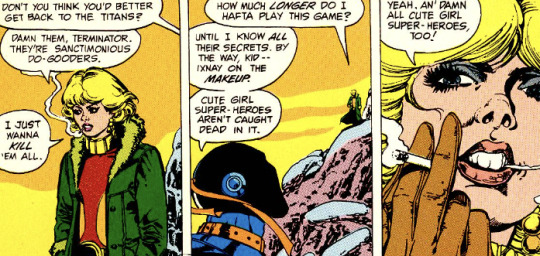
Terra is written to be a psychopath, but even with that intention in mind there are scene that shows a greater range of emotions. She has what could amount to a trauma flashback when Beast Boy too aggressively flirts with her and tries to kiss her and she reacts violently, trying to bury him under the earth.
Let's go ahead and interpret Terra as what is used as the fictional definition of a "sociopath" that is someone who feels no bonds with other people, someone with shallow emotions and someone devoid of guilt. Even if we interpret her that way, her story is still meant to be read as a tragedy.
Terra succeeds in her mission of infiltrating the Titans. Slade captures most of them, and the only remaining member Dick Grayson goes missing. Dick Grayson then unites with Slade's son Jericho, and the two of them team up in order to rescue the rest of their friends.
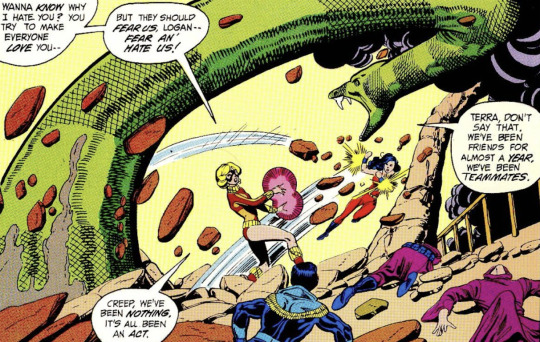
Even after all she's done the Titans try to make pleas to Terra during the final battle, which she not only rejects but responds to with violence. Which only confirms what I said above, Terra never grew to love them, she never regretted her actions, she only ever engaged with them with lies.
(Terra always lies, Terra always lies, Terra always lies).
Terra is declared by Raven to be devoid of emotions: "Her thinking is unlike ours. She feels no true love or hate. Her soul is corrupt. What she does is done without remorse."
Even after Raven declares this, however she still pleads with Terra to stop because she's going to hurt herself. Terra feels Slade betrayed her because he favored his son Jericho over her, so she decides to take both Slade and the Titans down. As the Titans fight her she begins to mentally fall apart ignoring their appeals to her and lashing out at everything around her. Eventually she makes one last attempt to everything around her, but the Titans escape and she only manages to bury herself.
At no point in the fight do the Titans give up on trying to reach her even as she's loudly screaming how much she hates them. Even after she's buried and it looks like she's dead, Gar and Donna both try desperately to dig her up on the slim hope she's still alive. When they find the body they even give her a funeral afterwards, even though they all think that Terra was beyond redemption.
Even the prose narration that accompanies her death is incredibly melancholy and bemoans her fate, at the same time as it calls her a outright sociopath.
There's no reasoning with her now. However slim, whatever sanity Tara Markov possessed is gone. Now there is only primal hatred! Hatred born, nurtured, and fanned. Hatred that festers and grows without care, without feeling, without plan. her pursed lips part and the sounds which echoes force are garbled and inhuman. Hot, boiling blood gushes wildly from the earth's open wounds, its skin fractures and cracks, and if a world could cry, it surely would.
Her name is Tara Markov and she is little more than sxiteen years old, and due to the fault of no one but herself she is insane. No one taught her to hate, yet she hates without cause, without reason. No one taught her to destroy, yet she destroys with glee, with relish. Don't look for reasons which do not exist, plainly Tara Markov is what she is, and she has taken a great power and made it as corrupt as she. Hers was the power over the earth itself she could have brought life to deserts, hat to the frozen tundra, food to sraving millions. She could have damned raging rivers, and tunneled water to packed lands dry and dead. her powers were limited only by the mind which controlled them. A mind which sought not hope, not love, not life, but death.
If you go with the text that she is just a sociopath beyond redemption who hates and hates and hates for no reason, the narrative still mourns her because a sixteen year old with her whole life ahead of being consumed by hatred and then dying because of it is in fact sad.
If you read into the subtext then you can argue that the events of the story, contradicts what the narration is telling us. Terra is being sexually groomed and groomed as a child soldier by a man who is much older than her, even if she thinks he's a partner he clearly has all power in the relationship.
If you think about it that way then Terra is the ultimate bad victim. She doesn't cry and call for help as a victim of sexual abuse, instead she tries to claim power for herself, she manipulates, and she destroys any chance she had for a genuine relationship because she only sees all relationships as transactions she can gain or lose from.
Even if you only go with the first interpretation, the narrative still remains tragic because the Titans themselves did not want to give up on her, they did not want to watch this sixteen-year-old girl destroy herself. They never stop reaching out for her and it doesn't work, because there was no way out for Terra but death.
Here's the thing I don't think Terra's status as a sexual victim automatically means an ending where she dies is offensive. It reflects a reality that victims like Terra often go unseen because they don't present their victimhood in palatable ways, and by the time anyone notices it's far too late. Sometimes tragedies are meant to reflect a reality where many people do not get saved.
There's two reasons that Judas Contract works as a tragic story. Number one the creators planned Terra's ending right from the beginning. Which meant they never gave her any moment where she shows that she's redeemable. There's no genuine bond between her and the titans, no wrestling with the guilt of her actions, nothing.
Number two, Judas Contract is Terra's story from beginning to end. It begins with her betrayal of the Titans, and ends with her death. The death is also brought upon herself by her fatal flaw her hatred, which is what makes her the protagonist of a tragedy. Tragedies are stories where heroes are undone by their flaws. Terra also goes out on her own terms. She buries herself underneath her own rocks. Her death is a direct consequence of her inability to let go of her hatred. Terra's not fridged for anybody else's arc, she retains her agency until the exact moment of her death.
To simplify into bullet points, Judas Contract works because:
The creators thought out what they wanted to do with Terra.
Judas contract is Terra's story.
Now, getting to the part where we actually talk about Avatar, and I start complaining about that awful, awful video.
AZULA'S ARC IS NOT WELL THOUGHT OUT
I just went on a long tangent on how Terra, a character written to have no redeemable qualities can still be tragic. How the creators marked her as clearly doomed from the start, and how she brought about her end on herself, how there no redemption for Terra. How this girl had no real chance, and how regardless of the fact Terra is a lil baby sociopath her fall is still tragic because of how well structured the tragedy is surrounding her.
It's awful to kill off a sixteen year old victim of sexual abuse, but the ending just fits because Terra represents a certain type of bad, unsympathetic victim who doesn't get saved.
Azula's arc isn't as well structured. The ending does not fit. I'm going to start by refuting some points in the awful, awful video I did not like.
"Maybe it's okay if Azula's story ends where it does in the series we would separate how we would treat a real 14-year-old girl from a villain in a series, ad that's why any redemption arc isn't need i a story after all. A character needs of deserves a redemption arc when it becomes the most meaningful way to explore their character and place in the story, but a character deserving redemption usually comes before the story really needing it, and I don't think Azula's done anything to deserve it yet. They've got to exhibit some willingness and action to change..."
So the main reason I'm using Terra as my first example is because Terra is the kind of character that Hello Future Me is describing. Terra was written with the specific intention she'd never experience a change of heart, all of the friendships she makes with the Titans are fake, she very loudly experiences no remorse, or even self-reflection over what she is. Terra's pretty proudly a monster and she never experiences any kind of self-doubt or regret over what she's become.
I can disprove right away Hello Future Me's blanket statement (with no actual cited examples, just trust him guys) that Azula never did anything to hint she may deserve redemption. That suggests Azula is an entirely selfish character who uses, manipulates and thinks she's right and worst of all is comfortable being the way she is, and therefore incapable of doing the self-reflection necessary for change.
Azula does show the capacity to do selfless actions several times in the narrative, and even consider the feelings of others. There's the apology scene with Ty Lee and the way she interacts with her friends in general with the Beach where when she's not fighting in a war or trying to complete a mission for her father Azula 1) interacts with her friends in a normal way and 2) seems to express a desire to experience normal relationships not the hierarchical ones she's experienced all of her life.
However, that's not the example I'm going to use as her save the cat moment. I generally intend to interpret that as a sign that even though she treats Mai and Ty Lee as subordinates and that power she holds over them eventually leads to them leaving her, their friendship isn't just Azula abusing them and lording her authority over their heads 24/7.
No, Azula's save the cat moments all revolve around Zuko. Which is funny, because the entire fandom seems to regard Azula as Zuko's evil little sister who exists to do nothing but torment her.
The first and biggest is Azula deciding to bring Zuko home in Ba Sing Se, and telling a lie to her father that he was the one to slay the avatar.
Ozai: I am proud of you, Prince Zuko. I am proud because you and your sister conquered Ba Sing Se. I am proud because when your loyalty was tested by your treacherous uncle, you did the right thing and captured the traitor. And I am proudest of all of your most legendary accomplishment: you slayed the Avatar.
Zuko: [Shocked.] What did you hear?
Ozai: Azula told me everything. She said she was amazed and impressed at your power and ferocity at the moment of truth.
[Inspired partly by this post]
Now the show seems to regard this action as Azula being an evil temptress who is there to tempt Zuko back to her side with everything he thinks he ever wanted.
That's only if you regard it from Zuko's perspective.
Think for a moment from Azula's perspective. Number one, Azula is someone thoroughly indoctrinated into Fire Nation propaganda who measures her self-worth based on 1) military achievement and 2) her father's approval and assessment of her talents. In Azula's own logic (wrongheaded as it is) she's helping Zuko. She's bringing him back home with his place in the line of succession restored and his father's approval.
Azula doesn't benefit from this gesture at all, in fact if her father discovers the lie she has as much to lose as Zuko does.
Now Zuko insinuates that Azula only brought Zuko along and told her father that he was the one who killed the avatar so she could let him take the fall if the avatar turned out to be alive.
However, if you look at the actual order of events that doesn't make sense. Azula saw the avatar die, she didn't know about the spirit water, and therefore had no way of knowing Aang could come back. In fact, it's Zuko who 1) knew about the spirit water and 2) decides to keep the spirit water and the fact the avatar might have survived a secret that is throwing Azula under the bus. After all she has as much to lose as he did and instead of sharing that information with her he decides to keep it all to himself.
Now Azula does imply that if the avatar were to turn out to be alive all of Zuko's glory would dry up, but this is only after Zuko 1) throws accusations at her and 2) makes it's pretty clear he's lying to her putting her on the defensive.
This is also a scenario where Azula doesn't have much to gain by bringing Zuko back, if you look at it from her perspective. If Azula just lets Zuko rot in a ba sing se prison, then her claim to the throne is secure. With Zuko back he's restored in the line of succession. She also, when making the decision to invite Zuko to her side probably didn't need him for her plan to succeed.
There is a dramatic moment of Zuko choosing to side with Azula over Katara which turns the tide in Azula's favor, but Azula can't see into the future and therefore wouldn't be able to predict that happening. If you look at it from Azula's perspective she 1) successfully infiltrated the city, 2) already had the Dai Lee in her pocket. She likely already thought she had the city secure at this point so her decision to extend a hand out to Zuko is therefore likely motivated by selflessness instead of self-interest.
That's important because usually when Azula usually only gives her help to others if it also benefits her in some way. Azula might genuinely see her recruiting Mai and Ty Lee to her side as a member of the royal family extending her favor and giving them status and security in their positions but it has the underlying motivation of 1) she keeps them in a position to beneath her and therefore in her complete control.
Azula will interact with Mai and Ty Lee like friends on the surface, as long she maintains control over them, but if they do anything to something that displeases her she'll do anything to regain her control.
Mai: I thought you ran off and joined the circus. You said it was your calling.
Ty Lee: Well, Azula called harder.
This is set up in Azula's very first interaction with Ty Lee. Azula greets her like an old friends, Ty Lee even seems happy to see her, but the second Ty Lee tries to say no to her Azula goes to extreme lengths to "persuade her". Azula's friendship with Mai and Ty Lee is an abusive friendship because there is a power differential and even if Azula feels genuine affection for them both it's clear they're not allowed to say no. Mai and Ty Lee are put into positions where it's in their best interest to please her, and live in fear of the consequences if they don't do just that.
Here's the thing, I'm not arguing that Azula didn't deserve any consequences for her actions. I'm arguing that the setup doesn't match her eventual ending. Azula is set up to have Mai and Ty Lee leave her from the very first scene that Azula interacts with Ty Lee. It's satisfying because the set up matches the pay off.
It's also tragic because it's Azula continuing the chain of abuse. The video isn't entirely wrong (which is why they came to the wrong conclusion frustrating).
Azula's fall is about how differenting parenting styles can a child. Ozai's affection is exchanged for being useful. Something Azula would go on to repeat with her friends, whereas Iroh's affection is something freely given with patience for imperfections and failures, something Zuko goes then on to repeat.
It's like... there it is it's so close. Here's the thing, Azula is set up for a tragic falling out with Mai and Ty Lee (and one she deserves) but the set up is different with Zuko. Azula's save the cat moment revolves around Zuko, and her genuine attempt to bring her brother home.
Yes, the first time Azula interacts with Zuko in season 2, she tries to take him home by force. However, by the ending of the season Azula's perspective on the matter has obviously changed because she begins by trying to bring him back as a prisoner, and by the end of the season invites him back as an equal.
There's no moment in Season 3 where Azula treats Zuko the way she does Mai and Ty Lee (unless Zuko provokes it first and puts her on the defensive) in fact most of her interactions are either them interacting normally (such as when Azula goes to find Zuko at their old beach house because she knows he'll be there and advises he leave instead of dwelling on their depressing memories) or Azula deliberately trying to look out for Zuko such as when she advises him not to go visiting with Uncle because it'll make others suspicious.
On the other hand, Zuko never at any point looks out for his sister the way Azula is demonstrated looking out for him. He doesn't say, try to tell her where he's going on the Day of Black Sun, or try to convince her the fire nation is wrong. There's a scene in the later part of Season 3 where Zuko is watching Azula fall to her death while sitting on a flying bison and not only sits there and does nothing about it, but sounds disappointed when she doesn't hit the ground and become an Azula Pancake.
That's pretty much the opposite of a save the cat moment. It's a "let the cat fall to their death" kind of moment.
Yes they were enemies at that point, but Zuko's the one who's supposed to learn that affection is something freely given with patience for imperfections and failures, something Zuko goes then on to repeat.
How exactly is he doing that in this scene?
The thing is... this setup doesn't have to be bad. Of course Zuko has trouble has trouble empathizing with Azula, he doesn't even think about sending a letter to Mai, Zuko's shown at this point to be like a healing abuse victim who's understandably focused on himself.
This in fact could be excellent set up with step 1) learning what genuine love and forgiveness is and 2) demonstrating those two things by applying it to others.
However, that's not where we got. We got Zuko watching his sister have a complete emotional breakdown, crying and screaming while chained to a grate and looking somewhat sad.
And once again to bring Terra into this, Terra is what Stay at Home and parts of fandom argue that Azula is. Terra screams at the top of her lungs how much she hates the Titans, how much she was always lying to them, and the Titans STILL try to reach Terra with words, try to de-escalate the conflict, when she's about to bring the rocks falling down on herself warn her she's going to hurt herself, and then when she's buried under rubble try to dig her out begging for her too still be alive.
Terra who's intentionally created by her writers to be as hatable as possible, is shown more compassion by the heroes in her ending than Zuko ever does to Azula. They also give Terra multiple opportunities to change until literally the very last minute, which Zuko doesn't do either.
What's set up is Azula has this save the cat moment with her brother, that Zuko is pretty much the only person she doesn't treat like a subordinate in the story (because she just like Zuko has a craving for familial love she tries to earn from her father). However, her ending with Zuko just taking her down doesn't fit that setup.
Azula's ending only fits if you consider her arc entirely from Zuko's perspective, which is the underlying issue. Azula's not the protagonist of her own tragedy, she's a plot object that's used to benefit Zuko's arc.
Azula's is written to have a downfall, the same way that Zuko loses everything at the ending of season 1 b/c of his inability to give up on the obsessive search for the avatar (and his father's love with it). Azula is written to be left by Mai and Ty Lee (this is the strongest point of writing when it comes to her since it comes from the beginning).
However, she's not written to be left completely alone and insane with the only empathy being shown is that her brother looks kinda sorta sad. That's only good if you view her as an object to further Zuko's arc, because isn't the ultimate culmination of Zuko beating his sister who has always been ahead of him at life? Azula needs to torn down completely without even some small glimpse of a hope of recovery so Zuko can be built up even moreor at least the writers of avatar seem to think so.
However, even Azula just existing for Zuko's growth and character development doesn't have to necessarily be a bad thing. This is where we get to MHA, which does the tragic siblings and the final Ag Ni Kai about 1000 times better with Shoto and Dabi.
THE GOOD
The comparisons between Shoto and Dabi to Zuko and Azula are made pretty often by the fandom. Shoto has a scar, Dabi has blue flames. Shoto has an arc about healing and learning what it means to be a hero, Dabi's arc is about self-destruction.
Dabi's not the center of his own story, he exists to foil Shoto and help Shoto reach the endpoint of his character development however that's not necessarily a bad thing. These are both two pairs of tragic siblings, the main difference is that MHA doesn't feel the need to tear down one sibling in order to build up the other. In fact, the final step to Shoto's arc is HELPING Dabi, not PUTTING HIM DOWN.
Not only that but the decision to help Dabi is a decision that Shoto makes on his own, and him going against the tide of a society that has already given up on Dabi and would much rather have Shoto shoot Dabi like a mad dog. Which makes the decision to do so even more powerful and emblematic of Shoto's growth.
Now you could say that Shoto and Zuko are too different to compare their arcs, Zuko has a redemption arc, and Shoto has what most people would probably term a healing arc. Shoto starts out the series as a hero.
However, this is what annoys me about the redemption arc debate. A redemption arc is really just a normal character arc. However, calling it redemption drags things like morality and forgiveness into the debate. if you take remove the discussion about moral philosophy both Zuko and Shoto have character arcs where they start the story defined entirely by their home situations and their father's abuse (hence why they have big obvious scars on their face), recover from their trauma, and go on to find an identity outside of their father and form healthy non-abusive connections with others.
In fact I'd see the theme of both arcs are the same, to literally find balance within themselves. Shoto is divided quite literally into right and left sides, fire and ice, and even seems to view himself as half of his father and half of his mother. Zuko is someone who's permanently marked and dishonored by the burn scar on his face. He suffers from an internal imbalance as well. Iroh says that Zuko is the descendant of both Roku and Sozin and therefore both pathways are open to him (but wouldn't that apply to Azula too). Zuko says to his father that the fire nation has destroyed the balance to the world and he's going to leave to assist the avatar in order to fix it.
Shoto's balance isn't just about fixing his internal trauma though, it's also about finding a balance between his family which has defined his entire life up until this point, and his desire to become his own hero not the hero his father groomed him into.
It's why the culmination of his arc is Shoto reaching out to save his family member Toya, because it's the ultimate balance in wanting to heal his family, and also the kind of hero he wants to be, someone who saves and brings peace to others instead of just violently putting down villains. He can bring peace to his family and become his own hero in one action.
However, let's go back to the beginning of Shoto's arc, because saving Toya as an endpoint to his arc is set up pretty early on.
Shoto's arc begins with Deku, a stranger breaking down Shoto's walls as an outsider in order to allow him to look past his own trauma and recall for the first time what he wanted outside of his resentment towards his father. This sets up the idea early on for Shoto that sometimes you need outside interference, help you didn't ask for, especially when you can't see outside of your own problems.
What Deku brings about ultimately is a change of perspective, Shoto's so hurt by the memory of his mother throwing boiling water in his face and everything that came after that he can't recall the memory of her telling him he could be who he wanted to be.
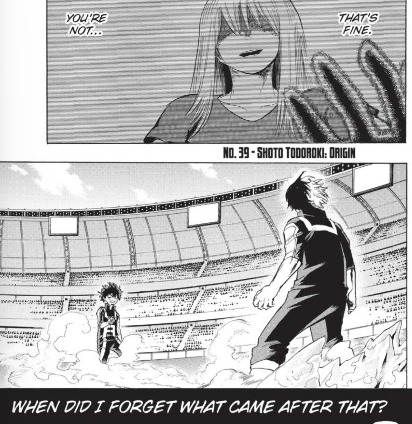
But, you want to be a hero right?
Shoto takes away two things from this arc, sometimes you need help even when you're not asking for it, and sometimes a change in respective is required in order to take the first step forward.
He goes to demonstrate these things multiple times, but here's two exaamples. The first Shoto demonstrates immediately after the tournament arc. When Iida is about to go down a dark path and commit a revenge killing on Stain. When, as a result of that IIDA is paralyzed and about to die in an alleyway, it's Shoto who both notices Midoriya and Iida are missing and shows up in the clutch. He's practicing the same thing that Deku taught him in the last arc: Giving help that's not asked for is what makes a true hero.
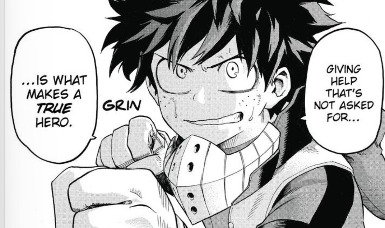
He even mentions the second idea, that a small change in perspective can be all it takes to save someone, and he wants to do for Iida hat Deku did for him. His words are the one who convinces Iida to stand back up again when he's paralyzed.
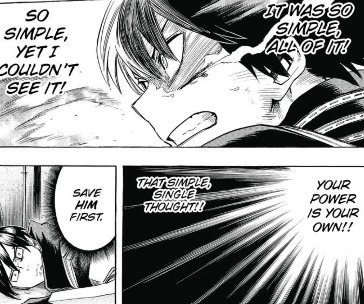
If you wanna stop this, then stand up. Because I've got one thing to say to you. Never forget who you want to become!
However Shoto's arc doesn't end here, because one of the major conflicts in MHA is that heroes don't pick and choose who to save and a true hero will give help even to those people who don't ask for it.
This is a point which further develops when Shoto's abusive father starts to show a change of heart at the end of the Pro Hero Arc. Shoto still holds his father accountable for what he did in the past, but he also acknowledges that if he had the capacity to change then so does Enji. This isn't about whether or not Enji is forgivable, this is an extension of what Shoto learned. Shoto originally believed he was controlled by the circumstances of his birth, that his fate was set in stone, but a change in perspective allows him to realize he can determine who he wants to be. So, Shoto is just applying what he's learned, Enji has the capacity to grow.
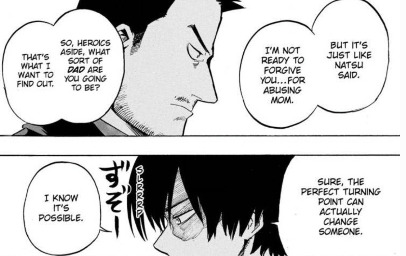
There's one final piece of setup that I want to cover before showing how these separate dies all culminate in saving Dabi. Shoto's not only someone who has to find balance between his family and his desire to be a hero.
The theme of balance is written into the quirk itself. Enji basically practiced eugenics to create Shoto as his masterpiece. He noticed a flaw in his own quirk where he could only make his flames so hot without overheating. So he arranged a quirk marriage with Rei who possessed an ice quirk to create a hybrid ice and fire quirk that he could use to cool himself off to prevent him from overheating.
Enji only ever cared about the fire half of Shoto's quirk. His ice quirk only exists for his flames to grow stronger. This is shown when Enji is trying to force Shoto to learn all of his signature moves, because he only cares about Shoto's flame quirk. Shoto was created to carry on his father's legacy, and surpass him with an even more powerful flame quirk. Part of his character development is him learning how to use his quirk in his own way.
This is a theme that continues in the class training arc where Enji is still repeating the behavior of trying to force Shoto to learn his signature moves instead of considering what he wants at all, because still Shoto only exists in Enji's mind to carry on his legacy.
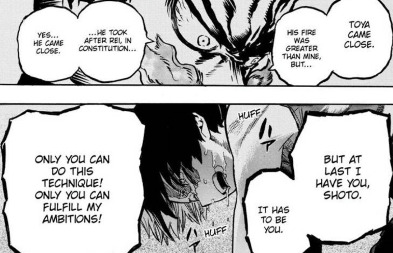
This all culminates in Toya's decision to save his brother. The first is his action in choosing to identify with his brother. If Shoto believes in his own capacity to change, and even his father's, then why would he deny Toya that same chance to change?
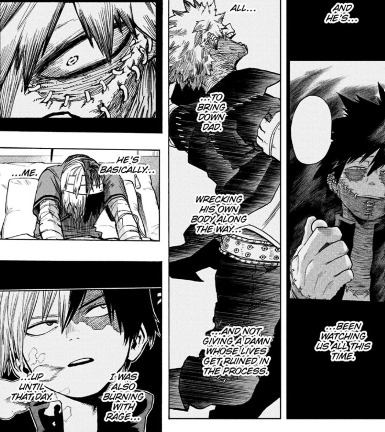
The foiling between Shoto and Toya isn't supposed to reduce the two of them to "Shoto is the good one, and he's the bad one", but instead Shoto and Toya were both in a point where they were consumed by hatred and couldn't see any other path in life. Therefore if Shoto was able to change because someone gave him help when he didn't ask for it, then Toya not only has the capacity to change - but in order for Shoto to stick to his stated beliefs that the smallest of things can bring about a change in people he has to be the one to give his brother that chance to change.
It's not about whether Dabi is worthy or not, it's about the themes in Shoto's arc finally being paid off.
Shoto's identifying with Toya, and even parts where he tells Bakugo he'll make Toya sit down and make Toya tell him his favorite food indicate that from the beginning Shoto's intention was to find a way to stop Toya without killing him (which is what several of the adult heroes were encouraging him to do).
@stillness-in-green does a more succinct summary of this plan.
Just me?
Because, like, Shouto had a plan. He spent the time between the two war arcs specifically developing a brand-new combat technique that he planned to use to shut down Dabi's combat advantage without killing him. He convinced his dad not to change the plan like Endeavor was hesitantly sounding him out about[1]; he went out and talked and asked questions, and even if they weren't the right words every single time, he did his best and he did it with intention. If Dabi proves to be dead, it won't be because of anything Shouto did to him; it'll be because Dabi himself chose to stand back up, take a warp gate across the country, pick a fight with the guy who doesn't have the power set to shut him down without unduly hurting him, and trying to replicate an Ultimate Move specifically tailored for someone with a balanced power set Dabi doesn't have.
And if Dabi lives, it's still going to be because Shouto booked it across the country and used that same technique to stop him again.
Shoto's decision to save Shoto is also a continuation of his decision to help save Iida from Stain. It's not enough for Shoto to experience a change of heart about his own life, he's got to take what he learned about people's capacity to change, and the importance of connections and then put that into practice and help others the way he was helped.
However, it also further develops the theme of giving help that's not ask for from Iida because Shoto's not saving a mostly heroic kid, he's saving Toya to help break a familial cycle of abuse (because murdering the abuse victim isn't how you end the cycle of abuse... actually).
Shoto's last lines to Dabi are also a refutation of this idea of destiny that he once thought he was ruled by. It's once again, Shoto teaching someone else the lesson he learned. Toya says a warped rail can never mingle with a straight and narrow one! In other words Shoto can never understand or get along with Dabi, because Dabi will forever be defined as the failure because of the circumstances of his brith, whereas Shoto will always be the success.
His final action is a decision to break the cycle they were born into: no, we're gonna mingle whether you like it or not.
Shoto's ultimate move Phosphor is not only a move he designed far in advance to take down Dabi non-lethally, it also is a rejection of his father's teaching method. Toya says he only ever taught me how to turn up the heat. Enji only valued both Shoto and Toya for their flame quirks. Developing his own quirk and breaking away from what his father wanted, specifically in order to save his brother. It's Shoto rejecting what his father created both of them for (a successor to his quirk) and finding his own path. By using that move to take down Dabi he's not only teaching Dabi their flame exists for more than just destruction, he's also by letting Dabi live giving Dabi a chance.
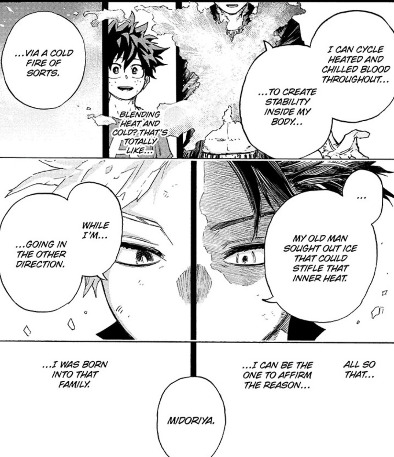
From a conversation with @class1akids
Dabi was the last push to unlock Shoto’s full power. Until then he was on the track of mastering flashfire like Endeavor planned for him (except for his own reasons) but realising the fighting Dabi with fire was gonna kill them both and also he’s simply no match fire only helped Shoto to fully take control of what his quirk is
Like his quirk development goes parallel with how he faces each member of his family and finally meeting Toya is like the last piece of his puzzle to find his own full power and identity.
It's not just Shoto decides to save his brother because he's just that nice, his arc is literally incomplete without it. The act of creating phosphor a move specifically to save Dabi is both him unlocking the full power of his quirk (by balancing the fire and ice sides of his quirk) but also achieving balance between trying not to leave his family behind while at the same time becoming his own person and hero outside of his family circumstances.
Citing my conversation with class1akids again:
Toya is endangering everyone at Gunga. Endeavor has no means to stop him and when he tries to murder suicide Rei interrupts and his “hero way out” is taken. All he can do is watch helplessly as his family is about to burn to death with a bunch of strangers he tried to protect.
But it would do Shoto dirty to use his heart technique to kill his family and the strangers so he comes in a clutch and I see that confrontation as the power trauma vs the power of healing in the family. With Shoto who is a true hero, they can put the fire out and save the family and strangertoo. Shoto become a balanced hero and bring relief and reassurance, Endeavor was completely helpless, and Toyas inner child got the attention he wanted, plus depending on how you read it, he may have become less suicidal.
Shoto also, and I want to point this out desires to stop his brother not to take him down but because he doesn't want him to hurt any more people. He's again finding a balance between two ideas 1) Shoto needs to stop his brother in order to stop him from creating more victims and 2) Shoto needs to find a way to stop him that's not just putting him down because Toya himself is a victim.
Shoto also, and I must point this out for the comparison between Zuko and Azula goes out of his way to engage Dabi in conversation, ask him why he didn't come home and what happened to him in the years after he died. This is especially poignant because unlike Zuko and Azula who grew up together, Shoto basically had no relationship with his brother (and the rest of his siblings really) before Toya died because Enji purposefully kept Shoto separate from all the "failures."
So yes, the act of saving Toya is more for the completion of Shoto's arc than any redemption arc for Toya but Toya's not just a plot object to move around for Shoto's arc, Toya has his own agency all throughout. In fact it's the fact that Toya resists being saved every step of the way that provides the challenge that Shoto needs to grow in order to be able to save him.
Toya's not just after revenge against his father that's the surface reason, Toya is also just blatantly suicidal. Toya's birth is marked as a failure, his death wasn't even acknowledged by his family and everything stayed the same in his absence, so he created Dabi while praying at his own shrine in order to mourn Toya. Dabi can't find any meaning in his life where he was born as a failure, so he'll use his death taking revenge against Endeavor for having been born in order to give his life meaning.
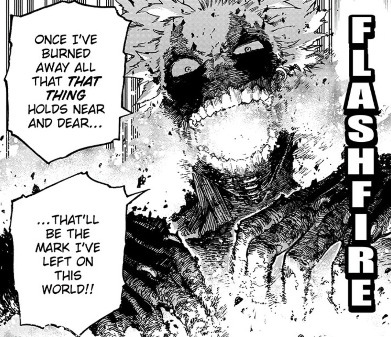
What makes Avatar look especially bad in its treatment of Azula in comparison to how MHA treats Dabi, is that Dabi is way, way less redeemable than Azula. For one Azula has clearly proven affection both her friends and her brother (and I don't think she even deserves Mai and Ty Lee's forgiveness they had every right to walk out on her and want nothing to do with her again.)
Dabi is probably the ugliest victim of the League of Villains. The rest of the league have far more moments in their bonds with each other. Toya is the outsider to the league even if there are some subtle hints to his affection (he tries to show up to save Twice, and also burns down Toga's family house to comfort her). The villains are mostly shown to be redeemable by their positive friendship with each other, and Dabi at several points denies the league's bond (he pulls a Terra and yells out loud at the top of his lungs none of the league matter to him). Unlike with Terra you can argue this is most likely Dabi trying to cover up his real feelings. However, the fact that he feels the need to hide his affection from the league shows he's purposefully distancing himself from any bonds whatsoever.
Unlike Azula who has gone out of her way to help her brother in one major way, and also shows hints in early season 3 of having that sibling bond with him Dabi just straight up wants to murk Toya. Azula also tries to murk Zuko, but that's only when Zuko leaves on the day of Black Sun (one without telling her, and two something that probably left her alone to deal with the consequences of lying to her father for his sake). Either way, Azula's behavior in early season 3 is setup for the fact that their sibling bond can be salvaged.
Dabi is way worse to Shoto in comparison. Dabi in the first part never saw Shoto as his own person, just a puppet of his father (puppets have no autonomy or personhood). His feelings towards Shoto only went so far as Shoto was someone who could kill in order to upset Enji. Dabi also doesn't particularly care for the rest of his family as well (only calling out Natsu's name when his brain is literally melting), they're either ways to hurt endeavor, or he wants to drag them in hell with him. Heck his last words after being saved is telling everyone to die and go to hell.
Dabi doesn't bother to make bonds with the league or have any lingering affection for his family because Dabi's determined to seslf destruct. He's given up on life the moment he saw that he died and nothing changed in that household, now all that's left is for him to create a meaningful death by dragging his family to hell with him.
Dabi is also even as a child made out to be an unpleasant victim. He attacks baby Shoto with his flames early on out of jealousy (even though he later admits that he was being unfair to Shoto). He makes the situation in the house worse by loudly screaming and demanding his father's attention. He screams at his mother and throws her complicity in Enji's abuse in her face.
This is in comparison to Shoto who in childhood flashbacks we are only ever seen either 1) crying, and 2) trying to comfort and protect his mother. Toya's even made out to be difficult to empathize with as a child - which like flew over half of the fandom's heads because he got accusations of somehow abusing his father and the rest of his family in that chapter at 10 years old. However, that in a way illustrates my point.
The fact that Dabi is so disliked by a certain portion of the fandom is because Horikoshi paints such an ugly portrait of Toya in the way he expresses his victimhood. It's done deliberately too, because number one Toya by resisting Shoto's attempts to save him and trying to self destruct instead retains agency as a character. He makes decisions even though they're bad self destructive ones, he's not just a prop. Number two, the fact that Toya is intentionally portrayed as such an ugly victim makes Shoto's decision to break the cycle of familial abuse by saving Toya and not leaving a single family member all the more poignant.
Toya is an uglier victim than Azula, actively trying to kill himself in a way that Azula isn't, and treats Shoto way worse than Azula ever treated Zuko and yet Azula isn't shown the sympathy or given the salvation that Toya is.
Because once again, the writers didn't think about the ending of Azula's arc or of Azula as her own character. Shoto defeating Toya is the culmination of his desire to break the cycle of abuse in his family. Zuko putting Azula down is just to make Zuko look better. It's in service of Zuko's character instead of both of their characters.
THE BAD
Avatar isn't setting up some gritty ending where the bad guys can't be stopped, they can only be killed. In fact it's pretty close in tone to MHA.
Season 3 especially is the season that really begins to hammer in on the themes that even the people on the enemy side are still human after all. The headband shows that Fire Nation children are indoctrinated into the war, but they are in the end still children. There's the story between Avatar Roku and Sozin, and once again Iroh saying that Zuko has both options becoming like Roku or becoming like Sozin available to him (but not Azula I guess). There's Zuko joining Team Avatar, even after he betrayed Katara in Ba Sing Se and should have burnt that bridge then and there. There's Zuko working to earn their trust again when no one on the team really owe it to him.
The main character of the show is a pacifist, who deliberately learns a way to stop Ozai without killing him before the final battle because he doesn't want to break the values taught to him by his culture.
If the entire theme of season 3 is redemption, healing and that the fire nation are not inherently evil then why does Zuko's sister and character foil end the last shot of the series screaming and crying with no one comforting or even attempting to sympathize with her. Why is this one character marked for tragedy in a show that is about redemption and healing and showing compassion to your enemies and very specifically not a tragedy.
Toya literally burns all of the flesh off of his body, and somehow he has a gentler ending than Azula, because at least Toya's arc ends with all the members of his family showing up to try to cool down his flames, and when he's on the ground burnt to a crisp his father finally apologizes to him. Toya is a skinless burnt chicken wing, my boy has no skin, and somehow he's better off than Azula.
I don't think the writers gave Azula such a cruel ending because they don't like her, but rather because they just didn't think about her ending outside of what it meant for Zuko. Which is why you get moments like Aang who is apparently a pacifist who doesn't want to kill the Firelord, watching his daughter fall to her death while sitting on a flying bison and doing absolutely nothing to save her. ALL LIFE IS PRECIOUS (except for Azula I guess).
It's not bad because a victim doesn't get saved, it's bad because it doesn't fit in with the rest of the story.
Not only is Zuko saving Azula a very natural conclusion to his arc, but there's far more setup for Zuko reaching out to his sister and saving her than there ever was for Toya and Shoto. Both Toya and Terra are screaming at the top of their lungs "I HATE EVERYONE, YOU SHOULD ALL JUST GO TO HELL." They're both making decisions and committing to their self destruction while Azula is a 14 year old girl having a mental breakdown.
Anyway, time to quote the bad bad video again.
"When does a villain deserve a redemption arc? When do we deserve a redemption arc? I know this is gonna hurt, but characters are not people. They are tools. They are represetations of people. They can be used to say other things. They can be symbolic representation of other ideas.
Azula's story is not just about a fourteen year old defeated by her brother for the throne, Azula is Zuko's character foil, where she is ruthless and practical, Zuko is empathetic and emotional. Where Azula's a prodigy, Zuko has to work hard to earn eve a fraction of her power.
I specifically chose to cite MHA, because of how differently it decided to use Shoto and Toya's character foiling. Shoto recognizes himself in Toya, and how different their paths were in life. This is explicitly motivates him to save Toya. It's also the culmination of everything that Shoto has learned because Shoto is a hero who believes that actions speak louder than words. It's not enough for Shoto to resolve his own inner struggle, he also has to help Dabi with his because that's showing Shoto has grown rather than telling us.
I think that is where the major difference lies between Shoto and Zuko, we're told that Zuko has chosen the path of empathy and healing, that he's learned to give people love and patience like Iroh has but instead of showing that the culmination of his arc is having a fist fight with his sister in a denny's parkinglot.
Azula is Zuko's character foil, where she is ruthless and practical, Zuko is empathetic and emotional. Where Azula's a prodigy, Zuko has to work hard to earn eve a fraction of her power.
If Zuko is empathic and emotional and that is why he's gained friends while Azula is now alone after having lost her friends due to the way she treated them, then like... what a great opportunity for Zuko to SHOW that quality of empathy.
However, Zuko doesn't do anything that Shoto does in the final fight. He's not even here for Azula, Azula's just an obstacle for taking back the crown. He doesn't talk to Azula, engage her in any way, try to de-escalate and avoid the fight.
If you want to make the tragedy that Azula and Zuko have taken such different paths in life that that Zuko fighting with his sister is unavoidable you could um... at least show Zuko being sad over the prospect of fighting his sister or being reluctant in any way.
(Before you come in here with "Zuko doesn't owe Azula anything take" this isn't about whether or not Azula is a terrible sister to Zuko, this is about the story that avatar is attempting to tell. Shoto and Dabi's fight is tragic because Shoto doesn't want to fight Dabi, he wants Dabi to come home and for their family to be complete. Zuko never expresses anything like that so where does the tragedy come from?)
If it were 100% committed to a tragedy like Terra's death then I wouldn't mind. if it were 100% committed to a story of redemption like Shoto reaching out to Toya then I wouldn't mind. My issue arises from the fact they want to have their cake and eat it too.
They want to give this tragic end to Azula, and use it to illustrate how Zuko has grown as a character. However, you can't have both.
If Zuko's growth is about learning that his father's love based on achievement and 2) learning he needed to get lost in life in order to find himself then why doesn't any of Zuko's actions demonstrate this lesson Zuko has learned about love, and about how you can be your own person outside what your father expects from you.
If Zuko has grown as a character he should be able to show those actions. He does show his new understanding of love and friendship to Team Avatar, but as I said that's easy mode. That's Shoto's attempts to save Iida, it's a step in the right direction. It's also not really Zuko demonstrating a selfless love, because he's also at the same time trying to earn their trust and earn his way into the group.
It's also not Zuko breaking the cycle of abuse in their family in any way. Shoto is trying to break free from his role of his father's masterpiece, and at the same time helping Dabi break free from his view that he's the failure.
It's also such a natural ending for Zuko's arc, to take the lessons he learned from Iroh and give them to his sister who needs them so they can both break away from their father's parenting. As I said Zuko does solve the internal conflict within himself, but he doesn't really demonstrate that by helping someone else find their balance.
If you wanted the tragic end, then it would have to be about Zuko's failure to reach out to his sister, because he hasn't learned how to reach out to her. Or because he tries and is unable to. The writers don't seem to understand that though, they think the tragedy is about Azula bringing it all on herself, and not the inherent tragedy of a fourteen year old girl being unable to be saved.
The set up is right there too, because number one avatar is about balance. So, wouldn't the true ending be finding balance between the siblings, not having Zuko rise and Azula fall. Number two, Azula being alone and friendless because of her own actions is again a parallel to where Zuko was in early season 2 at his lowest point. Except Zuko can be the better person in this situation by reaching out to her.
Zuko doesn't break the golden child / scapegoat dynamic, he just flips it so now he's the success and Azula is the failure.
While Azula's fall comes from cruelty and rejection from friends and allies it is Zuko's humility and kindness and friendship that ultimately wins the day. Him sacrifcing herself for Katara and her bringing Azula down and then her healing him.
Azula ending up imprisoned isn't something happening to a real person, it's a deliberative narrative choice by the author to say something about how people like this isolate themselves and end up alone. "
As I've stated above, I'm not saying Azula didn't deserve to take a fall. Her fall is actually set up from the first moment she met Ty lee. However, there's no set up for her fall being permanent.
Azula's given way more humanizing moments than characters like Terra or even Dabi. Which is why Azula being in an insane asylum for the rest of her life doesn't fit as an ending at all.
Azula is one link in the chain of abuse. Her father only gives out affection in regards to her usefulness. No matter what Azula is an asset first and a daughter second. Azula then repeats the cycle and treats her friends the same way. She has been shown through an improper model of parenting of using fear to dominate others with power and control and she replicates that in her other relationships.
Therefore, Ty lee and Mai leaving her is not only deserved, it's the perfect opportunity to pull the rug underneath Azula and to show her that her understanding of how relationships work is completely wrong.
This also mirrors Zuko's arc, because part of Zuko's arc is realizing just how wrong Ozai is for making both children earn his love, and that he doesn't need to measure his self-worth based upon his father's approval. He also learns about healthy expressions of trust and friendship from the gang.
Azula loses in part due to her own inability to form healthy relationships is losing people rapid fire, her brother leaves and joins the enemy side, Mai and Ty Lee betray her in favor of her brother, then her father in one action of leaving Azula behind and throws the title of Firelord to her after it's become completely meaningless reminds her of her place. Azula learns in about five episodes what Zuko had in 3.5 seasons to process that her father's love was always conditional and no matter what she did she would never truly "earn it."
People leaving Azula isn't exactly the problem, the problem is that Azula ends up alone permanently without being given the same chance that Zuko is. Terra, and Toya both get opportunities to turn back. They both refuse the hand that's reaching out to him. Mai and Ty Lee leaving is caused by Azula's own choices, but her ultimate end isn't. She's not even given the chance to turn away being saved like Terra and Toya do because Zuko doesn't even bother to try saving her. Her ending is not entirely brought about by her own choices, because the writers need her to take a fall to uplift Zuko.
Azula ending up imprisoned isn't something happening to a real person, it's a deliberative narrative choice by the author to say something about how people like this isolate themselves and end up alone.
I think once again it comes from the author's misunderstanding things because they don't want to look at the story from Azula's perspective, only Zuko's.
Stay at Home almost had it when he said the tragedy of Zuko and Azula was there to show how two different parenting styles affected these children.
The tragedy is that Zuko and Azula started in the same place, but Zuko had persistent guidance and someone who modeled for him a healthy kind of love. The difference is that Azula has never experienced any kind of healthy love or support on the level Zuko has, so she models all her relationships on the way her father treats her. It's not that Azula is offered some chance for change and rejects it, it's that Azula isn't even aware of the fact that there's another way because no one is there to show it to her.
Which is why I said once again, Zuko being the first one to show Azula the lessons he himself was shown by Iroh is such a natural place for his character to end.
Azula also even while completely alone and with no idea what healthy love is, knows that there is something wrong with her and is troubled by that fact in a way Dabi and Terra aren't.
Azula: I can sit here and complain about how our mom liked Zuko more than me. But I don't really care. My own mother... thoguht I was a monster... She was right of course, but it still hurt.
Then there's the famous mirror scene:
Ursa: I didn't want to miss my own daughter's coronation.
Azula:Don't pretend to act proud. I know what you really think of me. You think I'm a monster.
Ursa: think you're confused. All your life you used fear to control people, like your friends Mai and Ty Lee.
Azula: Well what choice do I have?! Trust is for fools. Fear is the only reliable way. Even you fear me.
Ursa: No. I love you, Azula. I do.
Both of these scenes indicate that Azula thinks of herself as a monster and is deeply uncomfortable with the idea. Considering Ursa is a voice in Azula's head and not a ghost, it also shows on some level Azula knew what she did to Mai and Ty Lee was wrong and feels conflicted over it.
Once again she's much more in conflict with herself than Toya and Terror ever are, and who's someone who's constantly warring with himself? Who's someone who could help resolve her inner conflict... Zuko (too bad the way the show's written he never does).
Azula doesn't choose to self-destruct the way that Terra and Toya did. Azula's ending isn't brought about by her choice not to change, because she's never given the chance to change in the first place. Her tragic ending would make sense if it was entirely of her own choices, but Azula doesn't retain her agency in the end it's literally taken away from her. She loses control of her mind, and her ending is being chained to a grate screaming and then thrown into an asylum.
I'm not arguing against Azula's ending because she's my favorite character and I don't want bad things to happen to her. It's because her tragedy isn't about her it's about Zuko, and her ending actively takes agency away from her where at least Toya and Terra both retain their agency up until the end. It's not good writing because the tragedy doesn't fit in with the rest of the story which is about balance and healing - and it's also ableist as hell.
THE UGLY
Azula's ending is unfitting to the tone of the story she's in, makes her and Zuko's arcs feel incomplete, and also is ableist as hell.
Here's yet more evidence that Azula's tragic ending is poorly thought out. Azula's mental breakdown doesn't exist in service of her character, but Zuko's.
Azula's issues pop up out of nowhere after episode 15, and take place over the last 6 episode of the series. The idea of Azula having a mental breakdown isn't necessarily a bad concept, but it's executed poorly.
The first way it's executed poorly is just how rushed it is. There's basically no hints of any mental instability beforehand. Of course people can have mental breakdowns spontaenously like that in real life, but this is a story and stories require foreshadowing. Azula spontaneously developing mental issues doesn't feel like it's planned as a part of an arc. First off, because the writers don't seem too sure about what Azula's symptoms even are. Hallucination, paranoia, manic laughter, but apparently she's still able to bend lightning just fine. Secondly, the writer's intentions for giving Azula a mental breakdown are pretty transparent.
The writer's room needed to come up with a believable reason why Zuko would suddenly be able to fight on equal terms with Azula, so boom sudden mental illness. The intent was not to create a sympathetic portrayal of a young girl struggling with both paranoia and delusions. The intent was to nerf Azula because they couldn't think of any other way this plot could end, other than Zuko and Azula fighting in a denny's parkinglot.
As I said they use mental illness as a plot device to take Azula's agency and choices away from her. It's not done with the intention of humanizing her, and in fact except for one small scene with her talking to her mother in the mirror it's a pretty negative and unsympathetic portrayal of mental illness. Not because the writers hate mentally ill people, but because they needed Azula to have a mental breakdown in order for a plot point to happen. Which is why they didn't think of the potential implciations of such a writing choice at all.
Now, people are going to argue about me so I'll use one final example. Azula's ending may be controversial but it's universally agreed upon that the Game of Thrones Ending was bad, right?
Game of Thrones uses mental illness as the exact same plot device, to explain why Daenerys Targaryen turns from a hero to villain in the last few episodes with absolutely no foreshadowing. In fact, the all of the show director's interviews about that choice are just blatantly ableist.
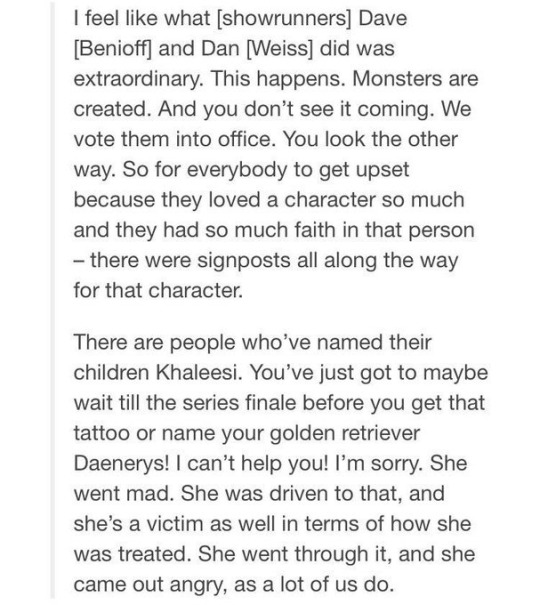
Rant from @hamliet
This quote is (likely unintentionally) gaslighting, ableist, terrible logically, and downright offensive.
First, ableism: why, why, why are we conflating madness with evil? She was driven to madness so she killed a bunch of people and had to be put down? And you think this is a great message in the year of our Lord 2019? [...] Additionally, while good writing is to an extent subjective, there are general consensuses on what make good writing--and Game of Thrones hit all the general consensuses for bad writing, from bad pacing to confusing character assassination. Critics are like, pretty united on this front. No one thought Dany’s turn made sense, even the ones who expect Mad Queen in the books. Maybe if people love a character who is meant to be evil you're not writing them correctly... or maybe they aren't meant to be evil.
Daenerys and Azula are incredibly similiar characters. They're both dragon themed, alligned with the element of fire, they're both colonizers they both represent the warrior princess archetype.
I'd say Daenerys is more of a tragic heroine though, because while Danerys is essentially doing the same thing as Azula, waging war in a foreign land and a culture that's not hers, for the purpose of then bringing back soldiers to her home continent so she can wage war again - while she is definitely a war mongerer she has good intentions. Daenerys for all of her faults, genuinely wants to break the chains and help out people.
I think Azula definitely sees herself as the hero for winning the war for the fire nation's sake, but she's completely uncritical of her own culture and she doesn't really have the good intentions that Dany has. She does it more out of a sense of duty, and her belief of divine right, not because she wants to break people free.
Daenerys's problem is that she doesn't understand the culture she's invading and the complicated world she lives in and despite all good intentions, is as I described above, invading a foreign power so she can go back and wage a war to reclaim the throne. Even if Daenerys would then proceed to go on to be the bestest queen ever that wouldn't change the fact her methods to get to the throne were incredibly violent, and she's sort of failing to break free from the cycle that led the Targeryen rule to fail in the first place.
Azula's problem is she sees herself as the hero and is therefore uncritical of fire nation values. She doesn't have any nobler intentions either other than service to her country, she just like Zuko is just trying to fulfill her duties as daughter and believe her birthright puts her above others. (I mean Dany does too but digressing).
Azula's more of a tragic villain who plays the antagonist role in the story, Danerys is one of the three heroes. However, she's more of a tragic villain in the sense that she's first season zuko pre character development just way more competent.
However, while Daenerys is a much more heroic character than Azula, here's the thing. I still think she's going to die. She is foreshadowed pretty heavily to die, and fail for her quest for the throne, because her entire story is a deconstruction of the warrior princess and the liberator archetype.
However, the story that GRRM is building throughout his books with Dany as an incredibly flawed heroine is different from what we got in the show, which was Daenerys going crazy and starting to murder people. That's because Daenerys turn to darkness wasn't about her character at all, it was just making her into a plot device to move their bad idea for a plot forward. That's why the turn is so unnatural and makes little sense with her character, that's why it's so rushed.
That's also why it's ableist, because it's using mental illness as a plot device to make a character unsympathetic and monstrous and give the other characters a reason to put them down.
The same for Azula, outside of one scene where he's talking to her mother, Azula's mental illness manifests in her screaming, maniacally laughing, looking like the joker did her makeup, and her instability also makes her violent and dangerous to be around. (Ignoring the fact that most people who experience delusions in real life are harmless, and more likely to be the victims of violence).
Her sudden mental illness isn't even used to make her more sympathetic in say Zuko's eyes and make him realize she's a victim, no it's just there to nerf her so she can be violently put down. The way she's drawn, the way she acts, it's to paint her as monstrous as possible. Her last action is like sobbing and screaming while being drawn as ugly as possible. She's not even given a small hope for recovery, because it just ends there. That's a pretty great message to send people that experience delusions, not only will you not recover or be shown sympathy, you'll also get sent to a mental asylum for the rest of your life. The choice for both Azula and Dany is not to portray any kind of mental illness in a respectful way, but to make a plot point happen.
As I said I expect Dany to die in the books, but there's a difference between dying as a tragic hero succumbing to your flaws but still having your good intentions acknowledged and just turning into a villain for no reason and being put down like a rabid dog.
(This is a quote I stole from a Shigaraki post but): "Why does she need to be put down in the first place, she has trauma, not rabies."
The problem isn't bad thing happened to my favorite character, the problem with the ending is it doesn't take Dany's setup into consideration.
Stealing from @hamliet again:
The thing about tragedies is that you have to manage expectations and clearly show that your tragic hero is doomed from the very early on–ie you have to show them making steadily worse and worse decisions (see: Eren Jaeger in SnK), if not directly tell your audience at the very beginning that this is a tragic story (ie see Greek choruses and Shakespeare, the prequels from Star Wars because everyone knows Anakin is Vader–plus I’d argue Anakin’s arc only works because we know he comes back to the light in the end.
Audiences don’t like reversing on set up/undoing structure. To make Dany a tragic villain is to go against the structure of her arc in both show and book. That’s why people don’t like it, even if the books makes it seem more believable.
Kate then goes onto describe a character that's much more comparable to Azula's. Honestly Arianne is closer to Azula than Daenerys is.
You know who is set up as a tragic heroine destined to descend and die because of her flaws in the books, whose arc has almost certainly been combined with Dany’s in some sense in the show?
Arianne Martell. (and another character known as f!Aegon)
In the books, Arianne is incredibly ambitious, and especially resents her brother and his quest for power. Like Margaery (another tragic character), Arianne seeks power and is intelligent and manipulative in her quest for it. But Margaery’s fatal mistake is that in seeking power and prestige, she’s become more a pawn than anything else for a villain (Cersei). She chose to play with lions, and she’ll be torn apart; that’s not surprising. Arianne, as her chapters hint, is going to almost certainly marry f!Aegon, playing with fire, and die burning for it.
Arianne’s grasping for her own power is never portrayed as cruel or stupid like the main human villain (Cersei); on the contrary, we empathize with a girl who truly cares about her people, but resents her father’s preferential treatment towards her brother. That’s the difference between Arianne and Cersei: Arianne cares. She is not cruel. But her pride is still going to get her killed.
There's a lot of game of throne females you could compare Azula to because GOT is full of queens, but like. Azula may be a tragic villain firmly on the side of the antagonists but she's not Cerseie. She's not queen, she doesn't wield the power that Cersei wields. In fact one of Azula's downfalls is finding out she doesn't have as much power as she thought she had, and ultimately was just a tool of her fathers.
She's not Rhaenyra or Alicent, because yes she may be grabbing for power but her character isn't affected by misogyny. Because once again, the writers simply didn't think about misogyny except for a really surface level "girls can be just as strong as boys" way so we really have no idea how women are seen in the fire nation. The show doesn't really explore if being a woman makes things harder, or makes people treat her differently than Zuko because the writers just didn't consider Azula's perspcetive on that matter.
Azula is alike to Danaerys in several ways, but as I said I think her ultimate end comes from Azula understimating her own importance in her father's eyes, and quickly realizing when her father is her only family left she never had his love or loyalty in the first place.
But Margaery’s fatal mistake is that in seeking power and prestige, she’s become more a pawn than anything else for a villain (Cersei). She chose to play with lions, and she’ll be torn apart; that’s not surprising.
Azula's most famous quote is about how Long Feng isn't even a player, only to find out her father considered her a pawn from the beginning and be broken by the revelation.
The difference being of course that Avatar is not Game of Thrones and it won't even kill the evil fascist dictator so it doesn't make a lot of sense to hand Azula the ending that Arianne got. They have the same fatal flaw.
Anyway, I made this big post but I can explain why Azula's tragic ending down't work in one sentence.
AVATAR THE LAST AIRBENDER IS NOT A TRAGEDY.
Maybe the reason Azula should get redeemed is because THE SHOW IS ABOUT F&%CKING REDEMPTION.
#bnha meta#mha meta#atla meta#azula meta#azula#princess azula#dabi#toya todoroki#shoto todoroki#azula redemption
335 notes
·
View notes
Text
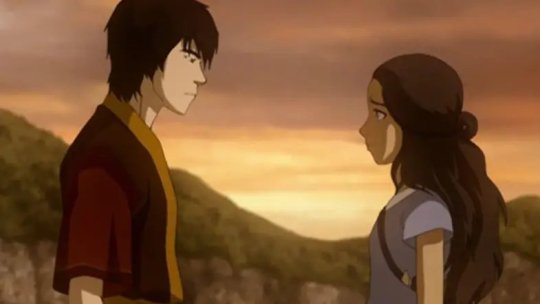
How The Bond of Zuko and Katara Enhances the Themes of A:TLA
When a subplot is intertwined with a story’s core themes, it creates a more cohesive experience, resonating more profoundly with viewers. For this reason, a good writer must always aspire for a coherent narrative in all of its aspects. So, what are the themes of A:TLA, and how do Zuko and Katara fit into them? To answer that, I’m going to break down each theme and discuss how it relates to the pair.
On Destiny
Your destiny might be unexpected, controversial, but it’s yours. No one can take it away from you. In Lake Laogai, Zuko and Iroh shared the following exchange:
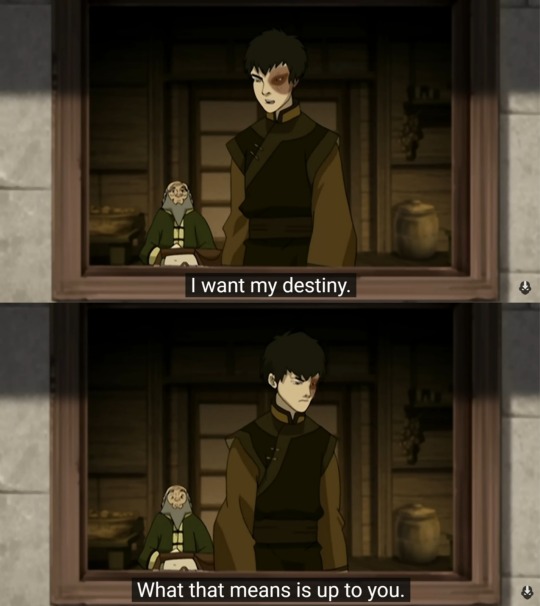
Even if people try, even if it isn’t acceptable to other people. Your identity will always be there, and you must make the choices that reflect your identity will always be there, because it’s your destiny. Near the series finale, in Sozin’s Comet Part 2, Iroh said:
“Sozin's Comet is arriving, and our destinies are upon us. Aang will face the Fire Lord.When I was a boy, I had a vision that I would one day take Ba Sing Se. Only now do I see that my destiny is to take it back from the Fire Nation,so the Earth Kingdom can be free again”.
In the end, everyone goes to their destinies. The destinies that they’re forging. Aang will spare the fire lord, Toph will use her metalbending to take down the airship, and Zuko and Katara will stand side by side against Azula. Who would have thought? Your destiny might be really surprising. No one could have guessed that Toph would invent metalbending, or that Aang would meet a lion turtle, or that Katara would stand by her former enemy’s side - by Zuko’s side.
Katara and Zuko’s closeness fulfill the show’s themes of destiny by being subversive and unexpected. They are fire and water, the daughter of the chief and the fire lord. Their friendship is rather odd, but it’s their destiny - not what was forced upon them. Moreover, their bond is subversive because it didn’t start as lovingly as it ended. Zuko and Katara were enemies, no one could have anticipated that they’ll grow close, but as I said, and the show said, destiny can come from an unexpected place.
On Diversity
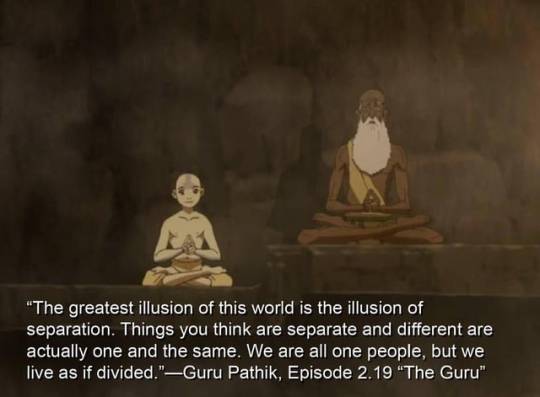
Separation is an illusion as well as the four nations.
Zuko and Katara were not only enemies, from opposite sides of the war, but they were polar opposites – the Prince of the Fire Nation and the last waterbender of the small Southern Water Tribe, fire and water. However, all of these differences didn't matter for them to form a beautiful friendship. Because they're not actually separate, they're both kind empathetic people. They have much in common. The superficial predetermined differences aren't separation. They're one in the same.
Additionally, one will gain from learning about the other nations, or as Iroh put it:
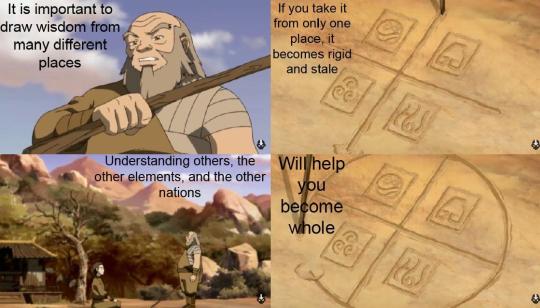
Zuko and Katara leaning into their opposites ties into the theme. In fact, Zuko himself learned to redirect lightning from a waterbending technique.
On Redemption
Many characters in A:TLA were given a chance to redeem themselves. From Mai and Ty Lee redeeming themselves by betraying Azula near the end of the show to Iroh whose redemption has long ended before the story starts. A:tla firmly tells us that while the path to redemption can be long and hard, it’s a path worth paving and it’s yours to carve. Zuko’s redemption arc specifically is praised as one of the best redemption arcs in tv history.
A part of Zuko’s journey towards redemption is his interactions with Katara. Earning her forgiveness is his final step into integrating into the Gaang, and his final act of redemption is to jump in front of a lightning bolt for her. It’s significant that it’s Katara who represents these milestones in his arc. He redeems himself to everyone, but not in the same way as Katara. The path to redemption through Katara’s eyes is longer and ends with a bang.
On Morality
Black and white notions of the world are incomplete. The Fire Nation isn’t all evil, as seen in The Headband, their citizens are simply indoctrinated. And there can be band people on the other side of the war, such as Jet. Fire isn’t just destruction, it’s also healing and life. And the opposite of fire can be just as destructive, as seen in The Puppetmaster when Hama showcases her bloodbending. In 06×03 A\ang concludes the following:
“Anyone’s capable of great good and great evil.Everyone, even the Fire Lord and the Fire Nation have to be treated like they're worth giving a chance.”
When Zuko and Katara first met each other, they thought of each other as enemies and nothing more. Katara saw Zuko as his worst self and the manifestation of her hatred of the Fire Nation. In the Crystal Catacombs Katara described him as "the face of the enemy". She saw him as all black and no white, but then he opened up. They discover they actually have shared experiences despite being on opposing sides. When he betrayed her, it seemed to confirm that they're not similar, that everything Katara thought of Zuko was correct. Of course, he came back, but Katara can only forgive him once she lets go of some of her hatred of the Fire Nation. His connection to Katara proves that they’re both seeing the world as shades of gray.
—————————
In conclusion, the profound connection between Zuko and Katara enhances the themes of the show and their connection is a perfect example of the messages it’s trying to put out. Rather it’s about destiny, morality, diversity or redemption, Zuko and Katara’s relationship is remains one of the most relevant examples of these themes in the show.
#zutara#anti anti zutara#pro zutara#zutara analysis#zutara evidence#zutara forever#zutara meta#zutara nation#zutara should have been canon#zutara supremacy#zutara was robbed#zutarian#zuko x katara#katara x zuko#kataraxzuko#zukoxkatara#katara#zuko#atla
167 notes
·
View notes
Text
Honestly, I like that we’re only now seeing Demetri feed into anger and make decisions he’ll probably regret later. Now, after Hawk has already had his redemption arc and rejected Cobra Kai’s ideology. I don’t think any sane viewer would have blamed him for going a little dark after Hawk broke his arm, but he didn’t. In fact, Demetri forgave Hawk extremely easily. He’s better than me, I don’t think most people would be willing to look past that so quickly.
So why now? Why does MIT hurt more than all the far worse stuff Eli did when he was in Cobra Kai?
Demetri has been learning Miyagi Do since s2. Before that, he disliked Cobra Kai’s way of doing things and only really clicked with karate when he was taught balance and self defense. Demetri is probably behind Sam and Anthony as the teen character with the least amount of experience in Cobra Kai.
But there’s a reason all the adult characters keep talking about balance. It can’t just be either all rage or all forgiveness. I can imagine Demetri harboring some pent up resentment over Hawk’s actions, buried so deep he doesn’t even realize it’s there until they have another fight.
And this time, it’s not Kreese’s brainwashing. It’s not that his best friend was angry about their lots in life and lashed out to extreme extents. There’s not a greater bad guy to point at behind Hawk, there’s not even really a bad guy. They’ve just been through a lot and they’re different people than they were when they first picked a college. Eli is telling him, “You’re my best friend but we’re never going back to how we used to be. We cannot go back and I’m not sure I want the same future as you.”
And this is after Demetri gets his best friend back. Apart from everything with Silver and Kreese, his life is going relatively uphill; Eli is good again, they have plenty of other friends, he’s dating Yasmine, and he’s learnt karate. Other than his friends’ success, he really isn’t looking for more than to preserve what he’s already gained. Losing MIT with Eli is a curveball he didn’t expect, just another thing he’s supposed to accept and move on from, and it happens when Demetri thinks he’s found security.
And then there Demetri’s motivation for wanting to compete in the Sekai Taikai. It’s not ambition. Demetri already got what he wanted out of Miyagi Do, he knows how to defend himself. In past seasons, he stayed because there was safety in numbers and of course he was against Cobra Kai. But now that Kreese is out of the valley, Demetri is still with the dojo because all his friends are there and he has developed a genuine enjoyment of martial arts. He doesn’t really want more. He says multiple times that he’s okay if where he’s at is the farthest he’ll go in terms of karate.
Demetri is comfortable being a side character. He doesn’t think he’ll ever outdo the core four or Hawk so he doesn’t see a point in trying. He wants to ride out the rest of his senior year with the dojo and then go to MIT, where he’ll do what he’s always been good at, where he might actually excel.
And Yasmine calls him out on this. They bonded when they were both at their lowest and she dated him while Demetri was helping the fight against Cobra Kai. She does not want him to throw in the towel too early and grow stagnant.
So, at first, Demetri really trains and tries his best to get picked for the Sekai Taikai to please her. But then Hawk tells him he’s unsure about MIT, and, “You chose my path?!” There was such genuine hurt in his voice, but Demetri could never hurt Hawk as much as Hawk hurt him. And Barnes said you have to be ruthless to get into the Sekai Taikai, yet Hawk showed him mercy, which Demetri exploits.
Demetri is clearly unsure of his actions when he takes the flag and runs. He seriously considers helping his best friend up. But when Eli decided to be selfish, he did so much damage, so why can’t Demetri be selfish this one time? Why can’t he lash out and take the victory he wants at the other’s expense? It’s not like he does anything worse than what Hawk’s done to him?
Sometimes you just need to hash it out and make up. It’s why Sam and Tory couldn’t spar properly after becoming friends; they realized they liked each other so they didn’t address their baggage. But because they didn’t, they felt at risk of falling into bad habits whenever the past finally did catch up to them. But they talked it out, they apologized for the things they regret, they brought up lingering resentments. Demetri wanted his best friend back so he forgave too easily, and now that they’re fighting again, so much past hurt is being brought to the surface.
Now that Cobra Kai is out of the valley, Demetri has started falling back to old habits. It’s been noted that he does most of the talking on Eli’s behalf in the early episodes of s6, his resignation about the Sekai Taikai reminds me a lot about his apathy towards high school in s1, and he assumes they’ll still go through with the college plans they made before their falling out. I do think Demetri genuinely wanted to be a part of the tournament but resigned himself after the team number was announced. When Hawk came clean about applying to MIT, Demetri finally decided to take more.
The show is about balance, it’s about finding a middle ground between defense and offense, Daniel and Johnny. I don’t think Demetri is gonna have a full blown villain arc or join Kreese or anything overly dramatic (we’re already getting that with Tory). He’s been loyal to Miyagi Do for too long. But that’s kind of the issue, he never fully let himself get angry at Hawk, and this is the result. Like Johnny said about Tory, if it takes a fight to process all your emotions, then fight, because holding it in will only make everything uglier.
#cobra kai#binary brothers#demetri alexopoulos#eli moskowitz#hawk moskowitz#johnny lawrence#tory nichols#cobra kai netflix#cobra kai season 6#cobra kai series#cobra kai s6#cobra kai spoilers#cobra kai season six#binary boyfriends
167 notes
·
View notes
Text
I'm actually so emotional about what a great character Charles is like-
He was bullied his entire life either by his father or his classmates but he's so kind and forgiving and chooses to be the nicest and most selfless person at all times.
Like- Even though his father beat him up all the time he didn't join in on the bullying and even when he dies, instead of becoming a bitter ghost or simply moving on he decides to help other ghosts move on and find peace.
And he would give literally EVERYTHING to protect his best friend. It seems like "oh yea he's just a selfless person" but when you think about it he does the most batshit insane stuff only to protect his friends. He kicks a random afterlife lady off a cliff, feeding her to a giant fish so Edwyn won't have to go to hell even though he's afraid of his own anger and doesn't want to act on it, he is 100% ready to throw hands with the cat king (a way older magical being with literal nine lives) at the slightest suspicion he might be harassing his friend, he goes to literal hell at risk of never getting out or getting sent to the afterlife afterwards, like- when it comes to protecting his friend(s) he knows absolutely no limits.
And he's also incredibly forgiving. In the kitchen at Esthers house in the last episode, I would've simply roundhousekicked Monty out the window at the first chance, redemption arc my ass. But he doesn't he simply smiles, forgives (to an extent) and then goes about his task. He's just such an incredibly sweet person.
And it's really just because he just wants to be loved. He just hangs on to that really friendly ghost who showed him kindness as he was dying and decides "yep I really want to stay with that person". This was probably the most love somebody showed him in a really long time. And then later he tries really hard to get everyone to like him (that smile on his face when Monty says he's a good friend).
I'm just sooooo emotional about that 80s ghost
250 notes
·
View notes
Note
Something I never particularly liked about Endeavor's atonement, is that he never gave or gave up anything he actually wanted.
Like Endeavor was always willing to risk his life and limb as a hero, so any life-threatening risks or bodily harm he receives is just part of the job he was always willing to do from the beginning.
Him building a house for his remaining family members, only he won't be there?
Endeavor never cared whether he lived with his family or not, all that mattered to him was creating the strongest hero in Shoto.
So he never showed any want to be with his family until Shoto was already on his way to being a great hero.
It was barely an afterthought to him that was never followed through on.
The ending only makes all this worse, because it looks like he replaced each member of his family that he lost with heroes, the people he really wanted to be around...
Fuyumi = Burnin, onima = Natsuo, Hawks = Touya
Shoto on the path to heroic success.
And Rei there too, I guess for some reason???
Just wheeling him around...
Do you feel similarly or different about all this?
DING DING DING We have a winner!
Endeavor never has to sacrifice anything, he never chooses his family over his precious number one spot. He only even remembered they existed after he got his Precious.
And something I noticed is he is full of shit, and believes his own shit.
Like he thinks that 'oh I'll make a house for all my family members to live in' (Which we never see happen, so once again empty bullshit as always). But he never asks them what they want, it is incredibly bold to assume they would all want to live together, or even be able to with their careers, and if the kids want to start their own families. We also know Shoto likes traditional Japanese flooring, but what about the rest of them, and does Endeavor even know that?
One thing I've never seen anyone call out is his manipulative gaslighting speech to Natsuo after being rescued from Ending. He says that he didn't save Natsuo because he didn't want to make like Natsuo feel like he has to forgive him, only to without hesitation force him into a hug. So fucking much for respecting Natsuo's autonomy.
And this ain't the first time this lazy coward has froze when his kids are in immediate danger, we see him standing safely outside the flames with his fire resistance while Touya who's weak to fire burned on the peak. With Endeavor of course claiming 'he did everything he could'.
We also find out he harrassed Fuyumi into giving him Shoto's, his fucking masterpiece, number. Which he uses to text Shoto, in the middle of not just his workday, but fucking class hours! So much is wrong with this, this doesn't make him look good or show any atonement or redemption. What it does is make me think a lot less of both this excuse of a human being and his daughter (The start of her enabler arc). He's doubling down on past behaviour, quite stupidly I might add. And why the fuck did he need to get it from Fuyumi? Presumably, he's the one paying for the phone, he should just have the number from that!
Once again this man openly admits he only offered the work-study to Deku and Bakugou to manipulate Shoto. And constantly favors him when it comes to teaching. Understanding Deku's word vomit isn't difficult, even with him stupidly over-explaining it
What we don't see (or hear of) is him doing anything for or with Fuyumi, the only kid that wants anything to do with him (despite her character profile saying she resents him)
He is constantly given credit for shit he actively isn't doing!
But he and the narrative constantly throw him a pity party the second consequences are even hinted at. Not to mention he is also constantly rewarded for his (non-existent) efforts, Shoto chooses to work with him, Rei forgives him, Hawks, Burnin, Best Jeanist, etc are around to lick his boots clean and make sure he doesn't have to face any of those hinted at consequences. Boo fucking Hoo, the League (and specifically Dabi in this) deserved to win, and by the end, I was convinced that they would have been better for society
#bnha critical#bnha#mha critical#bnha meta#mha#anti endeavor#my hero academia#mha meta#boku no hero academia#anti enji todoroki
102 notes
·
View notes
Text
MHA didn't create some miracle way of helping others. It was never promised to be this way. And when it came to villains...
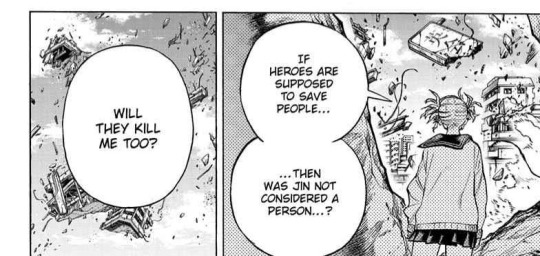
Spoilers for manga all the way to chapter 423.
The only way to get anything in life in MHA was to be born "normal" like everyone else and that way of thinking never left Izuku with Toga getting the same treatment she did before from everyone from her family to her "normal" classmates. It was Ochako who helped Toga even if just a little by lifting the weight of all the feelings that Toga had.
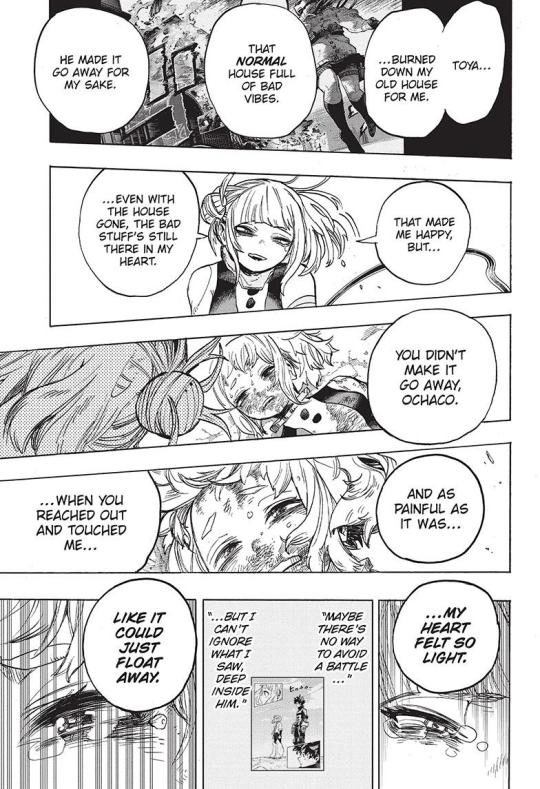
She couldn't save Toga the way one could save a civilian by saving them from harm. If it worked that way Dabi would've saved Toga even before Ochako could apologize for failing to notice Toga. She was so lazer focused on saving everyone else, that she was just another villain to stop, not a human.
Even if by the end of it Ochako helped Toga to deal with her grief, acceptance as it was wasn't something possible when a quirk makes you want to drink someone's blood from jealousy.
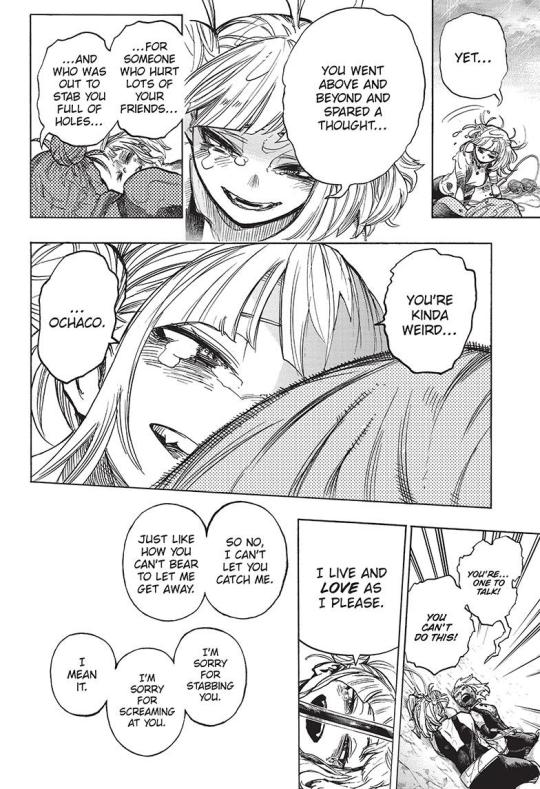
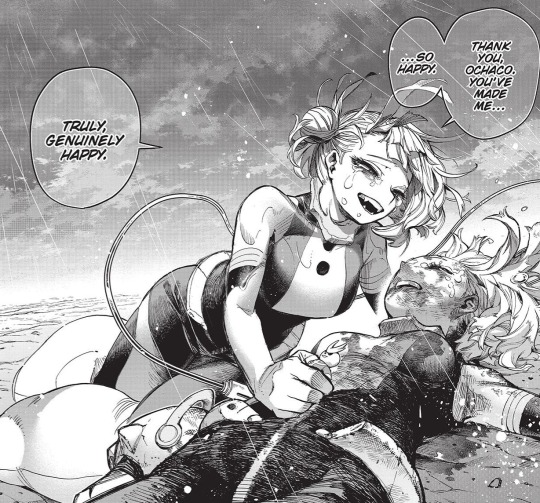
We got a bittersweet ending with Toga, in which she probably died from blood loss just like her double did in MVA. If it wasn't for Twice she would've died back then.
Giving away her blood for Ochako wasn't a redemption or a way to save Toga in the end, more as it was her being true to herself until the very end.
Just like Twice chose to stay with the League even if Hawks offered him a way to survive that battle. He refused and died protecting his friends who accepted him instead of choosing to betray them and accept Hawks' offer.
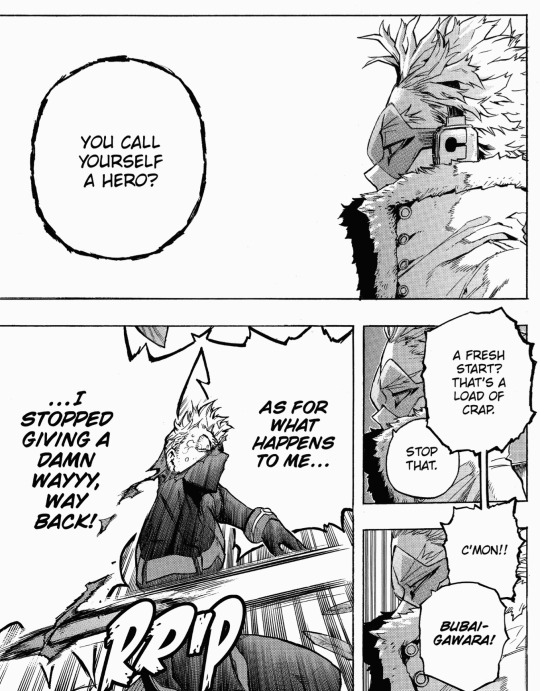
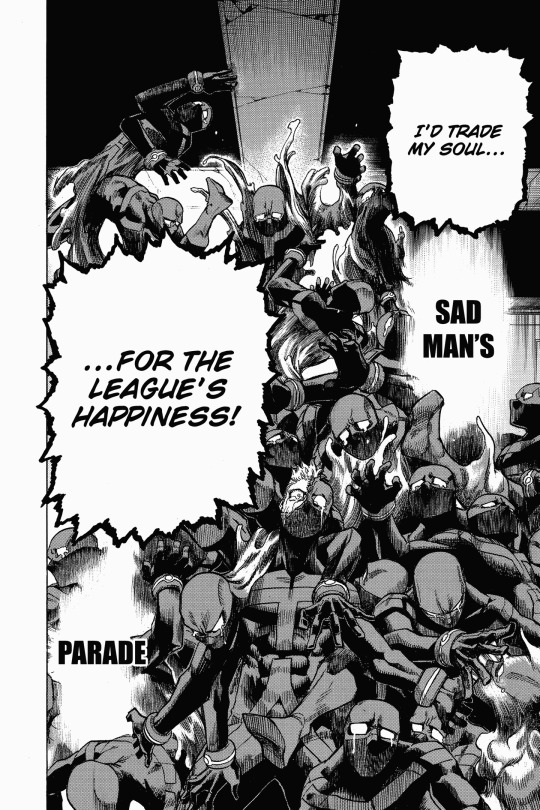
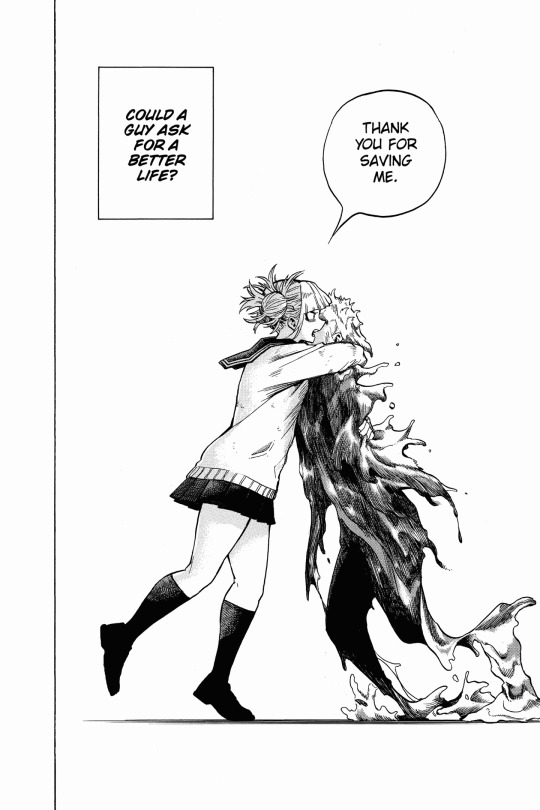
After Twice's death... It was a matter of time that more 'active' LoV members would join him as well. As sad as it is, we now can return to Izuku.
Who, after his time OFA-AFO quirk space, now wanted to help a "crying boy" he saw in Tenko just as before with Katsuki in chapter 1. He didn't forgive Tomura and didn't excuse the way he chose to solve his problems.
It didn't mean that Tomura would survive in their battle, even if Izuku didn't see killing others as a way to solve problems. He didn't understand Tomura, but he still wanted to try, and try he did.
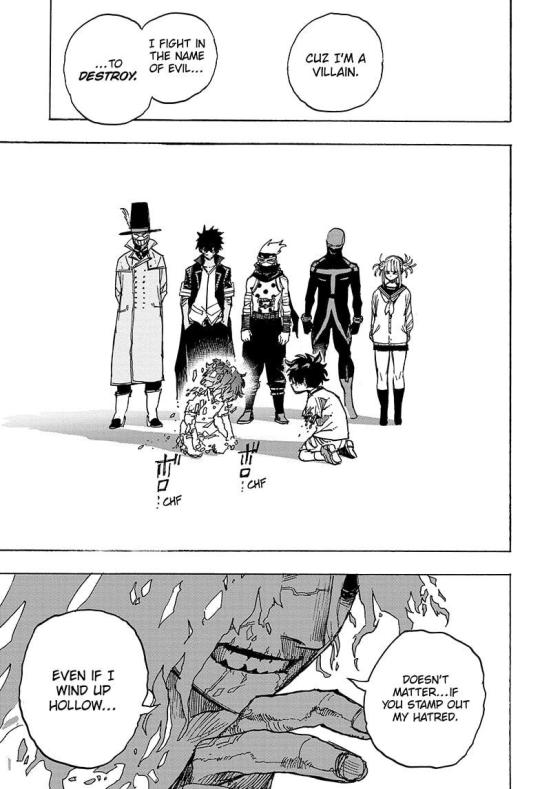
The rest of this post was nothing more than a contextual prologue to understand that it's not the first time a hero failed to save a villain and in Twice's case we know that he died and his death was the reason Toga started thinking about her own possible death and Dabi finally revealed himself as Toya.
The goal of saving a "crying boy" never was an end-goal for Izuku in the Final arc, since helping Tomura deal with his feelings just left him hollow with a goal that clashed with Izuku's. As being a hero for villains meant destroying the world for them to help them live freely.
But that was before AFO resurfaced.
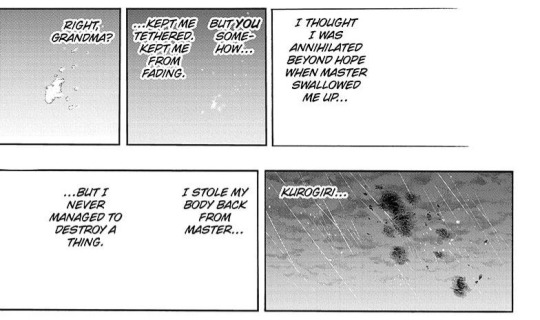
Sadly after that Tomura who was talking about making his own choices for a while now stopped doing that. Even if he still had a goal of helping villains and only villains, Tomura was almost gone. And his goals were now unreachable.
Izuku helped Nana who in turn kept Tomura from fading away entirely. In MHA there were countless situations where Izuku's help affected people by helping a different person to keep hope, All-Might being the first one and Nana being the last one at the moment.
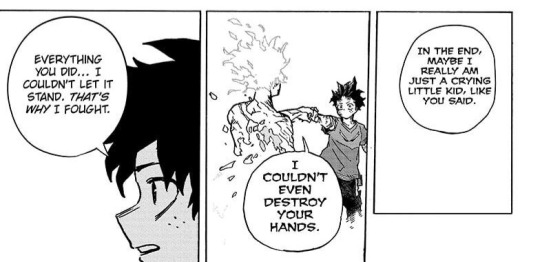
Hollow after Izuku helped him to get rid of his hatred Tomura could do the only thing he did - accept the situation as it was.
Accepting AFO as his Sensei, accepting Stain's ideals and Overhaul's deal was the way he solved his problems. Just like Izuku had a problem of understanding something outside of his norm, Tomura was accepting too many things, which lead to his downfall after accepting AFO's quirk.
Just like Twice could've given up everything that he had for his friends so did Tomura.
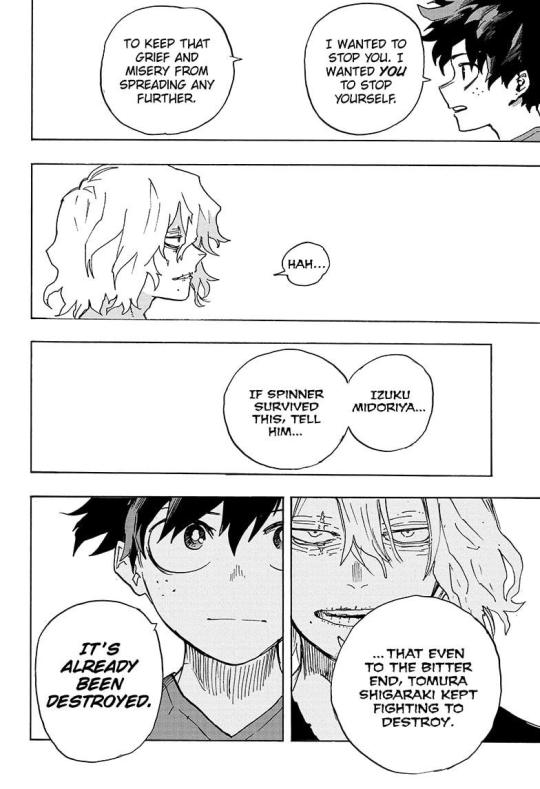
With Izuku helping as much as he could let Tomura to finally rest as he wasn't really living ever since waking up in the hospital. With his body now affected by AFO's wishes instead of his own until the end.
In a way Izuku didn't succeed in his wish for Tomura to stop ever since PLF war arc. As he "kept fighting to destroy" no matter how hard Izuku tried to stop him.
The only thing he succeeded in was changing Tomura's mind about himself, instead of viewing himself as a monster he accepted that he was a human just like Izuku said. A "crying boy" who couldn't really destroy Izuku's hands in the end.
For a group of Villains who weren't supposed to get profiles of their own at the start of the series, League is slowly fading as the most memorable group that there was in MHA, getting backstories, their own Villain themed arc all the while being as human as anyone else.
As sad as their story is they were not "unlucky", they didn't need a happy false ending where they would need to change to be normal - they chose to live this way and they lived it to it's fullest.
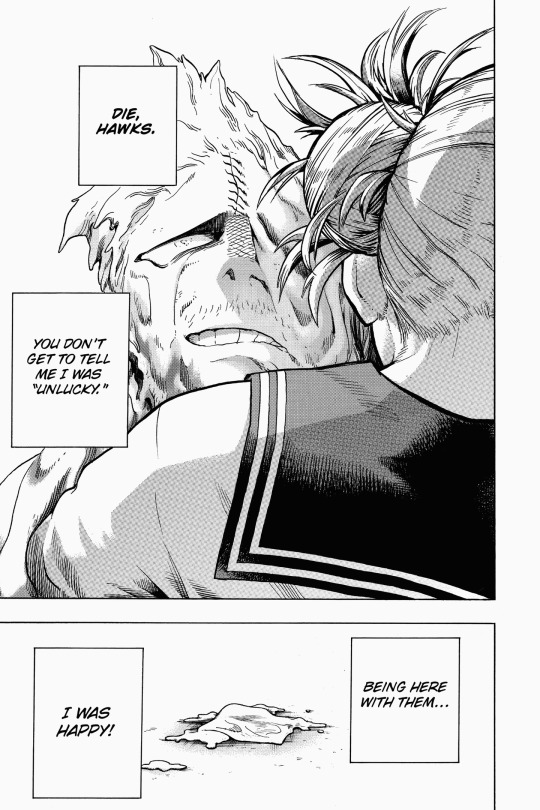
#bnha#bnha manga spoilers#bnha analysis#league of villains#shigaraki tomura#tenko shimura#toga himiko#mha twice#midoriya izuku#ochako uraraka#todoroki touya#dabi#spinner#shuichi iguchi#not art#While writing this I've been rewriting it time and time again#But by the end of it I just started crying because god... I didn't want them to end like this#Also I finally found the tracks that connect to the scene of Twice's death#Which may or may not have been a reason I started crying#Anyway the reason I wrote this was as simple as that - I read Twitter got sad and needed some way to cope#Because I'm getting sick from all 'oh they'll survive' yes HEROES might survive all of this VILLAINS would not#Magne died Twice died wnd Kurogiri literally became a cloud in the sky#I do hope that Spinner would be at least alive because leaving Mr. Compress alone with no sushi too is just too cruel#While writing this I suddenly found myself so frustrated with Izuku that my last tries to write this ended in a trashcan instead#it's so fucked up#To be a LoV stan and see how Class 1-A is getting the best ending they can with so much hope while LoV is... Dead :(#this is a mess
173 notes
·
View notes
Text
A Story Done Right
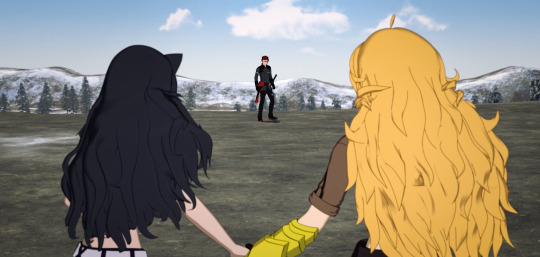
Kill Bill, The Princess Bride, Blue-Eyed Samurai, Wrath of Khan. Our media is saturated with revenge stories. Even children's tales often have revenge as a sweeping premise (e.g., the countless Star Wars villains as a modern example, but older tales such as Cinderella were even more rife with vindictive messages). And to be honest, I have never cared for this plot type.
Revenge stories are usually violent, merciless, myopic, and pretty disregarding of 'collateral' losses. Not all, but most lack any type of interesting moral symbology and substitute dynamic storylines and complex character development in lieu of exciting action scenes and a prosaic fixation on bloodshed. There are certainly exceptions to this, many of the titles I listed above actually have a lot of great things going for them. But I would say that these qualities are in spite of their focus on revenge and not because of it.
And there are an endless number of animes, movies, books, and other stories based on revenge that simply do not appeal to me (not judging other people if they like violent action media, just not my personal taste). Most of the time, I am just left feeling empty at the end, like Neo after volume 9.
But there is one exception to this theme. One revenge story that leaves me feeling whole, not empty. From the banner image, I think it is pretty obvious which story it is. This is my own highly subjective opinion, but I truly believe that the fight with Adam represents the perfect revenge story. And here is my reasoning.
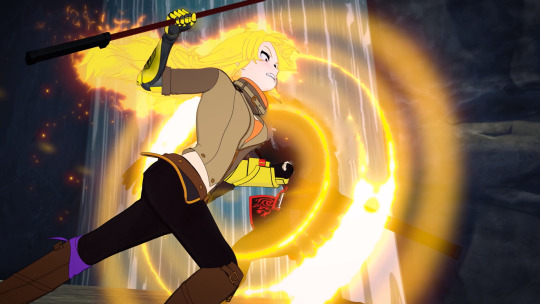
Revenge is Not The Hero's Purpose
In too many stories, the premise begins with douchebag 'X' killing damsel 'Y', leading to hero 'Z' killing a lot of henchmen and blowing up a lot of buildings all for the singular purpose of making Mr. X pay. Once they achieve this purpose, they look around aimlessly before wandering off to have a milkshake or play golf or something. Yeah well, this story does not do this. Killing Adam was never the objective for Blake and Yang, because they have actual goals that involve saving people and not just executing some vendetta.
Don't get me wrong. I love redemption stories, I find them so much more satisfying, especially when the character in question has to struggle to overcome the gravity of what they have done (note: a redemption arc does not mean instant forgiveness, it might never end with actual for absolution for what they have done). I love Emerald's story and think it has a lot of interesting twists that it can take. But there are some characters who are just too far gone to save. And Adam fits that perfectly.
He has a tragic backstory and I truly pity him. But he is also an abusive, murdering shitlord who manipulated and groomed Blake (I wouldn't be surprised if he physically or sexually abused her, which is somewhat implied by her frequently defensive body posture, but is not definite). He kills out of spite and represents Yang's demon, who she could have become. It was cathartic to watch him fall, but I am ever so grateful that his demise was not the purpose of Blake and Yang. Because killing him out of spite for what he did to them would not be much different than the way he lashed out at others for the traumas that he has endured. Some might call it justice, but justice and revenge are two sides of the same coin and the edges between them can be blurry.
The point is, Yang and Blake are so much more than Adam. They killed him out of necessity, not out of hate.
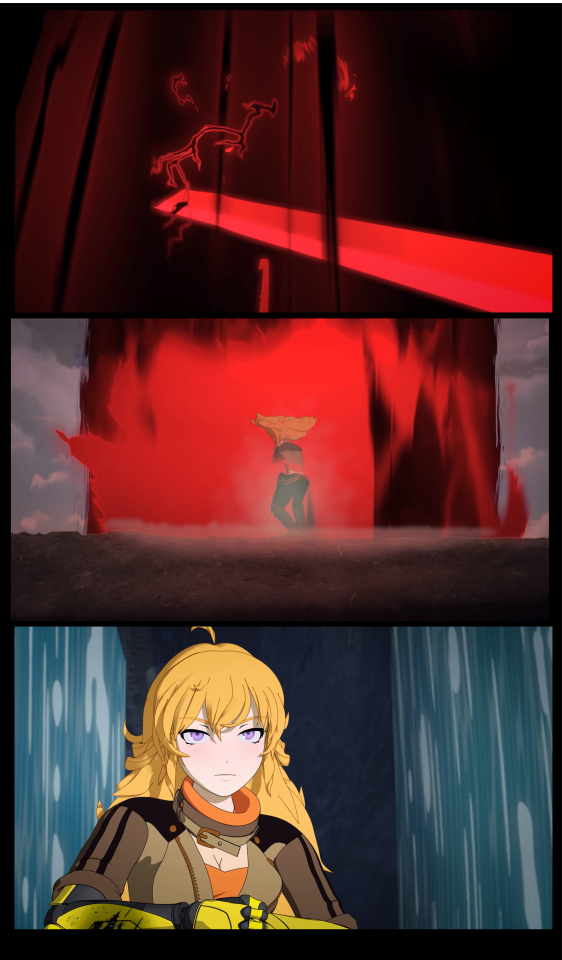
They Are Set on the Future
As I mentioned, I often feel empty at the end of a revenge story. When the villain lies dead within a pool of their own blood and the hero has achieved everything they sought to accomplish, what more is there really? Often, I feel like the story has reached its ending without really achieving anything of note. Often, without really making the world a better place. A plot about revenge is not the same as one about taking someone down to save other people. The former is what Adam wanted and it would have made the world a worse place. But Yang and Blake are protectors. The fight was exhilarating and satisfying, but it ultimately humanized these characters whereas most revenge stories do the opposite, treating human life as cheap entertainment to be killed in the most 'epic' way possible.
But more important, the fight left me feeling excited about the future, rather than feeling burn out from seeing the villain die. Adam was fixated on the past. He was a character of the past. He represented Blake and Yang's trauma, their old demons and fears. He had no further place in their character arcs, because they had evolved into something so much more. Killing Adam was not the end of their story as it is in so many revenge plots. It was simply a new beginning. It felt whole and wholesome. Past, present, and future.
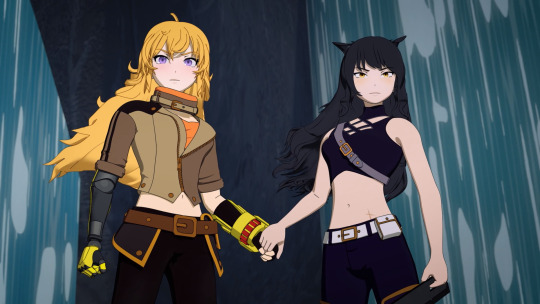
Because it is the People Who Matter
Ultimately, the fight was never about killing Adam. It was about bringing Yang and Blake together. About having them overcome the demons of their past. About the importance of mental health. About their individual traumas (abandonment issues & PTSD for Yang and Blake's fear of hurting others). About the challenges that LGBTQ+ people face in finding security in a hostile world. It was about these two, fucking amazing characters and the ineffably wondrous relationship that forms between them. One based on actual fucking support, equality, and love.
That is all I have on this right now. Hopefully, I did not offend too many people by criticizing typical revenge stories. But I have been wanting to talk about my love and appreciation of this scene for years. I know there have been so many more people who have discussed these same themes and points before, probably more adroitly than my rambling mess, but this is my rambling mess. Thanks for reading!

Random side trivia 1: Mandy Patinkin, the actor who played Inigo Montoya in The Princess Bride, is famous for his iconic line, "Hello. My name is Inigo Montoya. You killed my father. Prepare to die." Mandy felt that the scene was symbolic of feelings towards the illness that took his father. But regarding revenge against people, he actually dislikes his iconic line and how it idolizes revenge.
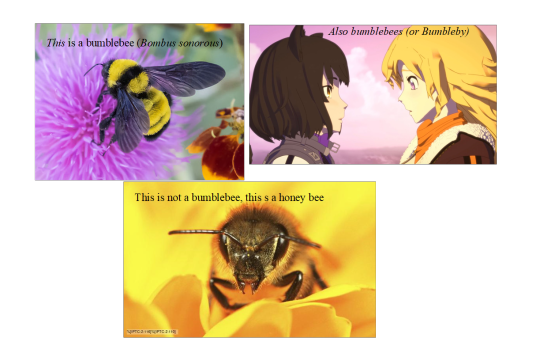
Random side trivia 2: I love Jeff & Casey William songs and I just love BMBLY (except or that creepy line about the birds and butterflies knowing, wtf). But as an ecologist, I should note that bumblebees do not make honey. Jeff was thinking of European honey bees. Bumblees are cute, fuzzy, chunky super pollinators that live in the ground, in hollow plant stems, or other obscure spots and are either solitary or have very small hives. They virtually never bother people and are super pollinators, actually much better pollinators than honeybees (which are super awesome cool in their own right, but also highly invasive in the western hemisphere and hurt our native pollinators D: And yes, I cherry-picked the ugliest picture of one that I could find). Many bumblebees are endangered, just like our beloved Bumblebees. Save the bees! AND THE BEES!
169 notes
·
View notes
Text
Weighing in on ATLA shipping discourse

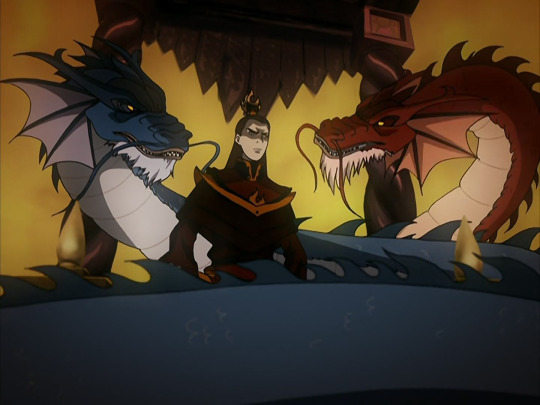
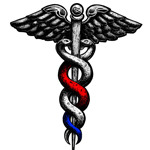
Iroh: You're not the man you used to be, Zuko. You are stronger and wiser and freer than you have ever been. And now you have come to the crossroads of your destiny. It's time for you to choose. It's time for you to choose good.
Why did Zuko have a fever after decided to let go of his Blue Spirit mask? Well, the imagery suggested that he experienced a Kundalini awakening. A Kundalini awakening is a profound spiritual experience that involves the activation and rising of Kundalini energy, located at the base of the spine. In Hindu and yogic traditions, Kundalini is often depicted as a coiled serpent, symbolizing dormant spiritual potential.
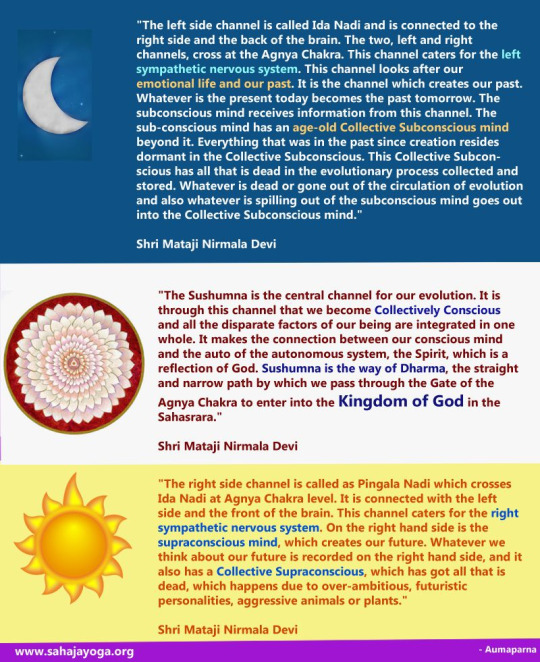
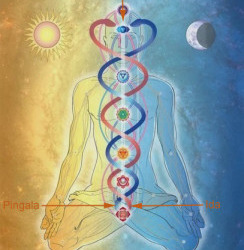
Ida and Pingala are the two energy channels that run alongside the spinal column and correspond to the left and right sides of the body, respectively. Ida is associated with the feminine or yin aspect. It is linked to qualities such as calmness, receptivity, intuition, and nurturing. It is also associated with the moon, coolness, and the element of water.
Pingala represents the masculine or yang aspect. It is associated with qualities such as activity, dynamism, alertness, and willpower. It is associated with the sun, warmth, and the element of fire. In the yogic tradition, the balance and harmonization of Ida and Pingala are considered essential for achieving physical, mental, and spiritual well-being.
Once the two energies combine at the crown chakra, a person's consciousness is supposed to transcend duality. What does that mean, exactly? It means to move beyond the perception of reality as consisting of opposing or dualistic concepts, such as good and bad, light and dark, right and wrong, or self and other. You understand that these apparent opposites are part of the same unified whole and are interconnected in a deeper, more profound way.
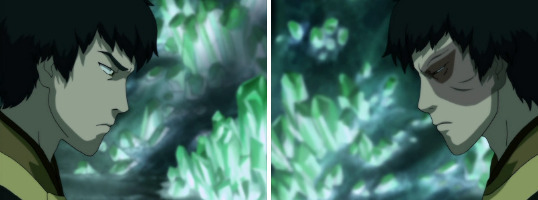
"I was head writer of ATLA, and this is exactly how I see it! There was some controversy that Zuko made the "wrong choice" at the end of season 2. A lot of fans were ANGRY! But it had to be this way… we wanted him to get everything he thought he wanted. The triumphant return. His father's respect, and a seat at his right hand. Only then could Zuko truly outgrow these things, and choose to do the right thing in a meaningful way."
(Aaron Ehasz)
So, the symbolism definitely favors Zutara in that respect. Katara learned through Zuko that the Fire Nation is not innately evil. Even though he hurt her with his "wrong" decision, part of her character arc was understanding why he did it and being able to forgive him. And because he made that choice, she could trauma-dump onto him and that led to her gaining closure about her mother's death.
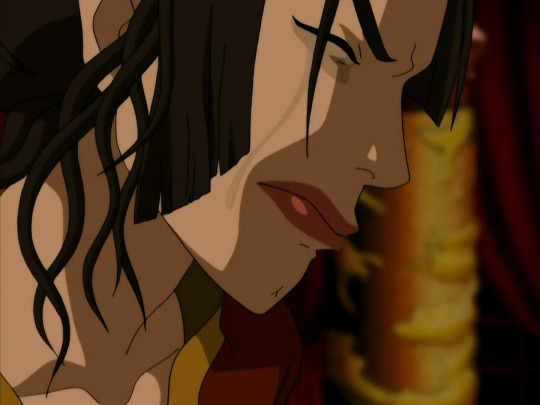
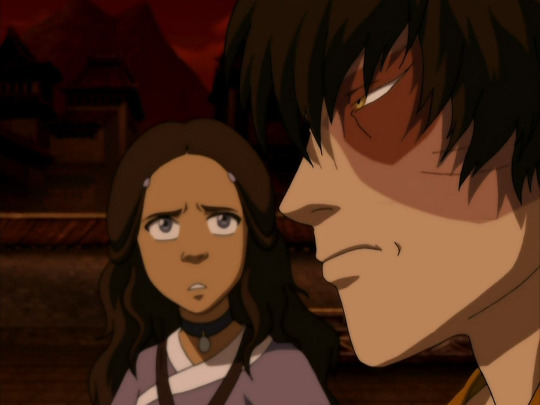
"I was head writer of ATLA. Azula and Zuko's relationship was not always well understood, even by the team internally. Azula loved Zuko, more than anyone save her father. She also felt competitive with him for their parents' attention of course, but since she had alienated herself from her mother, she focused her energy on pleasing dad… which of course meant acting in more and more intense and possibly evil ways."
"By the end of the series, of course, her loss of her friends shatters the part of her identity that she could somehow control affection and love through intimidation. As a result she spirals… I did however intend to leave a kernel of humanity, and had we made a season 4 Azula would have completely bottomed and we would have explored the possibility of a path to redemption. True story!"
(Aaron Ehasz)
But it's not even just Zutara. What I found interesting was that Azula was the blue dragon and Iroh the red dragon. Azula was crazy and needed to go down, right? By siding with his sister, you're meant to think that Zuko chose "evil" instead of "good". But it looks like some of the writers meant for it to be more complicated than that. There was no "good" or "evil" choice. Azula had a softer "yin" side, too.
Zuko wanted to get along with his sister. He did not want to kill her, even though Iroh thought that was the only option. The fact that Azula never got her redemption arc did a massive disservice to Zuko's arc as well. The fact that Azula had good in her is exactly why Zuko's choice in BSS couldn't truly be called "wrong" or "evil".
Azula loved Zuko and that idea wasn't conveyed very well in the cartoon. She was the one person on that beach who actually did understand him. She was jealous that Zuko chose the Avatar over her. And she knew that targeting Katara with her lightning was the best way to hurt Zuko. Katara found a non-lethal way to defeat Azula for Zuko's sake. Because after seeing how hard it was for him to fight her, she finally understood why he made his choice in Ba Sing Se.
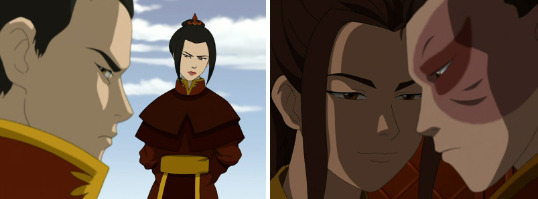
"[Azula] had not bottomed in the end of season 3, she had further to go. At the deepest moment in her own abyss she would have found: Zuko. Despite it all, her brother Zuko would be there for her. Believing in her, sticking by her, doing his best to understand and help her hold her pain that she can no longer hold alone. Zuko — patient, forgiving, and unconditionally loving – all strengths he gained from Uncle Iroh."
"And I always imagined that after coming out the other side, she would be one of those people who hilariously over-shares her own feelings all the time, and that she would be a bit over-apologetic. Like a Canadian version of Azula."
(Aaron Ehasz)
The first episode of Book 3 was called The Awakening. Aang literally awakened to the energy twisted up in the middle of his back. He did not complete his spiritual transformation. The Kundalini energy did not reach his crown chakra. It was still blocked because he had an attachment to Katara that he hadn't worked through yet.
Zuko's awakening was figurative. Mai didn't understand how he felt. Symbolically, when she turned his head to kiss him, it showed the audience the scarred side of his face. When Zuko lied his sister, the unscarred side of his face was shown. I suspect that the writer for the episode, Aaron Ehasz, wanted to hint that Zuko did still feel a connection to Katara and didn't want Azula going after her and Aang.
Zuko in The Crossroads of Destiny was not supposed to be the same Zuko from The Avatar State. Both versions of Zuko still wanted to go home. But 201 Zuko was motivated more by selfish attachment. 220 Zuko was more motivated by love. He loved Azula unconditionally. Even with all of her twisted, ugly, and cruel behavior. His consciousness had transcended the duality of Iroh and Azula being opposites where one is "bad" and the other is "good". During The Beach he was fantasizing about a time when Iroh played with both of them as little kids. Back when they were all a family.
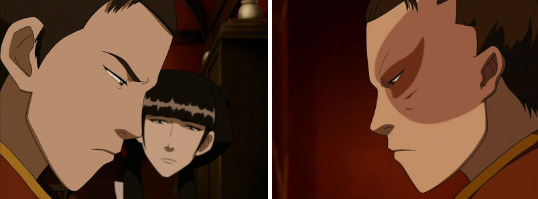
Mai: You know what will make you feel better? Ordering some servants around. I might be hungry for a whole tray of fruit tarts. And maybe a little palanquin ride around town. Double time.
I don't dislike Mai. I think she is an interesting character who was not a bad person or anything. I just thought she served a very specific narrative purpose. She was there to show how Zuko wasn't compatible with his old lifestyle anymore.
Mai wanted a typical socialite boyfriend. They really didn't get along too well or have much to say to each other during The Beach. She didn't like him when he started talking about his trauma and showed his uglier side. Zuko was insecure and jealous because he was not even sure if she really liked him. And she didn't even know the person he was after his banishment, only the person he was as a child. When he turned his head away from her, his unscarred side was shown.
Zuko: When I got to the meeting, everyone welcomed me. My father had saved me a seat. He wanted me next to him. I was literally at his right hand.
Mai: Zuko, that's wonderful! You must be happy.
Zuko: During the meeting, I was the perfect prince. The son my father wanted. But I wasn't me.
He walked out of that war meeting with the scarred side showing. Mai didn't love Zuko. She loved the perfect prince. The fantasy she built up in her head and the role Zuko was acting out at the start of the episode when he was ordering her the fancy fruit tarts.
Mai: I guess you just don't know people as well as you think you do. You miscalculated. I love Zuko more than I fear you.
Mai stood up to Azula to save Zuko, and she genuinely believed she loved him. But he left her behind to be with his new companions. If not for Ty Lee, she would have died. That should have been the end of that relationship. I thought it was very weird that they got back together. The NATLA writers should definitely find a different way to conclude Mai and Ty Lee's character arcs. Especially Mai. She deserved a more dignified ending than being left in prison and then threatening her ex-boyfriend to take her back.
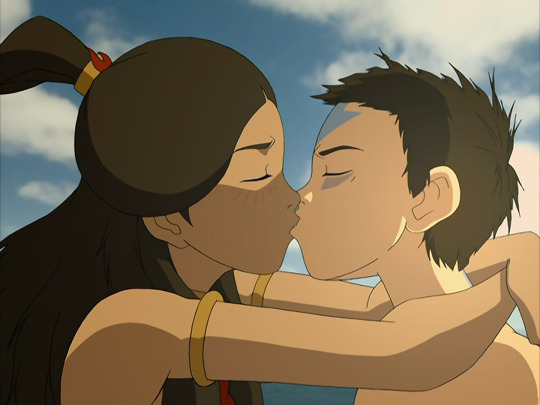
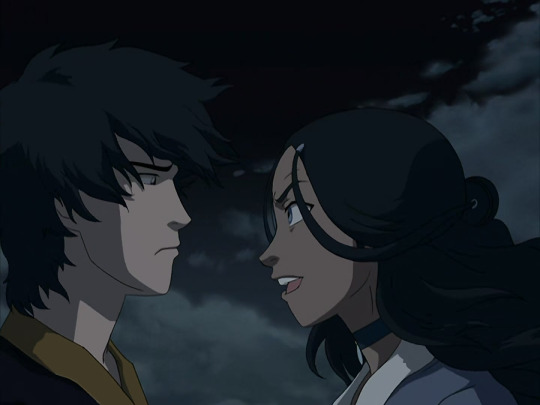
"I love that even though Aang is sort of not in this story very much, to me, he's-his presence is in all of these scenes 'cause you know he's like the little angel on her shoulder [...]"
(Bryan Konietzko)
The main reason I think the shipping discourse in the ATLA fandom is so toxic is because the creators Mike and Bryan saw the narrative differently than the other writers. They seemed to have a completely different vision for the story and characters compared to the head writer. So, there were two conflicting visions and fans who liked one over the other could argue their side indefinitely. Bryke saw things as more black-and-white and good vs. evil. You can see it in some of the interviews and commentary, particularly with Bryan.
IMO, there really was no "good" and "evil" side in The Southern Raiders. There was no "angel" or "devil" sitting on Katara's shoulders. To Katatra, what Aang said must have sounded like nothing more than a trite platitude. It's true that in the end, she didn't choose violence. But I don't think Aang's words were very pertinent to her decision-making when she finally faced Yon Rha, LOL.
It's understandable why Aang would come off as preachy, though. He was just a child coping with his own grief. The Air Nomads' philosophy was one of the only things he had left of them, after all. Such a teaching was no doubt his own personal coping mechanism.
Aang was right in the sense that Katara didn't need to resort to violence in the end. But ya know, maybe she would have if she didn't have someone by her side who understood her inner darkness and accepted her even if she had chosen violence. Just like how Aang might have killed the sanbenders if Katara hadn't been there. And Katara would not have condemned him if he had done so.
"Zuko and Katara might have shared some sparks, but sometimes there are people along your 'journey of love' who are there to teach you about yourself and what you really need, but don't necessarily end up being your partner. Come on, kids! 'Zutara' never would have lasted! It was just dark and intriguing."
(Bryan Konietzko)
Zuko was a character of duality. Yin and Yang. Light and shadow. His two sides were represented by the scarred side and non-scarred sides of his face. I think Bryan viewed Zutara as a "dark" ship because a big part of Zutara was about Katara's shadow side.
Just like Mai did with Zuko, Aang built up a fantasy version of Katara in his head. The perfect, well, "waifu," I guess. The endlessly patient feminine maternal figure. The sweet beautiful girl with such manageable hair. But that's only half of who she was. There was another side to her that he never saw. One that used bloodbending. Angry, hateful. Yes, even ugly. And that's not a bad thing. It's human.
205 notes
·
View notes
Note
POC can forgive Tommy. That's a valid opinion, and it's not my place to inform them of their feelings on racism.
However, both Hen & Chim never imply forgiving Tommy after Tommy decides to treat them like they are humans (Chim specifically mentions still being isolated because of his race years after he started). They treat him kindly because they are kind people, even before he acknowledges them. Nor does Tommy ever apologise for some of his behaviour. Hen even goes as far as to state that she is not friends with people who had left the 118.
As a woman in a historically male industry, I've heard women get negative descriptions/comments for things men are praised for and had their opinions/requests ignored only for a man to bring up the same thing and it be heard. Tommy's brand of misogyny is still around. Based on his comments/tone in 7x03, I'm hard pressed to believe he's changed in that aspect.
A lot of people tolerate people who hurt them because it makes situations easier. (Not any less painful)
Y'all really need a crash course in contextualising/comprehension/media/plot literacy.
AGAIN-
Tommy's character was never intended as a mainstay. So all the redemption/reconciliation that happened, was only able to be shown in a small montage. The show isn't going to allocate a lot of time or a full episode for a redemption arc for a character that was not meant to be permanent.
The montage however, did show that Tommy Hen and Chim all reconciled. IT IS IMPLIED. That's why in later episodes, Chimney could still call on him to put out the house fire that nearly killed Eddie. And that's why he could still be trusted to be contacted when they needed to rescue Bobby and Athena.
Because Tommy's character didn't have the luxury of a full episode to redeem himself, the audience is expected to contextualize their reconciliation. We didn't see Tommy actually apologize, but we do see him and Hen and Chimney embracing each other after having a farewell party for him. That shit wouldn't happen if Hen did not like him/reconcile with him. Therefore IT IS IMPLIED.
We're not even sure if he'll be a mainstay in season 8. Or of he'll just be a peripheral character like before. The point is, his character won't be fully fleshed out until they decide if they're giving him a full arc as a main.
So y'all are crucifying his character before it even gets a chance to flourish because he's getting in the way of your preferred ship. It would be so much better if y'all can just admit that instead of virtue signaling & using racism as a means to justify your horrible behaviour towards not only Lou (who's just doing his job & now have to deal with delusional fanatics who send him death threats & make up lies about him as a person when they don't know him at all), but also fans of the show who like the BuckTommy ship.
Additionally, y'all have taken to socmed and have made the entire show about this, being absolutely INSUFFERABLE in all of the cast's comment sections whenever they post anything remotely related to buddie or Tommy. It's why Oliver deleted X, and it's why Ryan has a hard time being on socmed, why Aisha has her comments limited & why Tim Minear had to make a post about y'all sending him death threats after he didn't include the karaoke scene. It's insane behaviour.
It's also not lost on me, that y'all typically do this to female characters who get in the way of your preferred ship.
#anti bucktommy#anti buddie#buddie fandom#bucktommy fandom#buddie#bucktommy#911 abc#fandom discourse
118 notes
·
View notes
Note
Hey does everyone remember when Aang physically hurt Katara via burning her due to his own negligence with fire because he didn't listen at all to her concerns? But all of Katara's concerns were her being worried for him getting hurt and not herself, and then he hurts her badly, this never gets addressed again in the show, but I remember this vividly.
i actually like this scene on its own.
aang burning katara is a good character building moment because it's a brutal reminder of his own capacity for destruction. he needs to understand that his reckless actions can have horrific repercussions in order to fully realize the weight of his responsibility as both a firebender and the avatar, and it makes the moment where he uses zhao's recklessness against him more impactful. it also sets up the "water = life, fire = death" dichotomy that's part of katara's arc on viewing the world in binaries, which will later be broken down in book 3.
but ultimately the incident is still of greater significance to aang, and he's the one to bring it up in the guru and western air temple episodes, telling both guru pathik and zuko about his guilt over burning katara and his refusal to firebend ever again. this experience is also what leads him to accept zuko as his firebending teacher, and then finally forgive himself when he learns the true meaning of firebending. for the most part, it's a well-sustained arc and one of the few narratives aang has that is actually brought to completion.
do i wish that katara and aang had actually talked about his actions beyond this episode? yes. do i wish the aftermath had been focused a little more on katara instead of showcasing the impact of her physical injuries mostly through aang's continued self-flagellation? yes. but as a one-off incident contained to a single episode, i don't mind it.
what i do mind, however, is that this is not the last time the show is going to use katara as a lynchpin for aang's character development.
in the book 2 premiere, katara is turned into a pawn to propel aang into the avatar state. in the guru, her imprisonment is the reason that aang chooses to go back to ba sing se instead of unlocking his chakras. that is three separate times now that katara has been damselled in order to facilitate key turning points in aang's narrative, but not once does the same apply in reverse. there is never a moment where aang is the only one put in danger solely to drive katara's arc, the way she is in his. the closest we get is katara bringing aang back to life, but even then his death is still the result of his own choices and more integral to his storyline than hers.
now, compare this to the final agni kai.
at first glance, katara being put in danger just to complete zuko's redemption looks like the same tired trope, and had the scene ended at his sacrifice, it would be. but crucially, it's katara who continues the fight. katara who defeats the scion of fire nation destruction at the height of her power. katara who saves zuko just as he saved her.
in proving herself a master waterbender powerful enough to defeat azula and save someone she loves - someone who sacrificed themselves for her - from fire nation aggression, katara brings her own arc full circle. it is in triumphing over azula by saving each other that zuko and katara become the people they were always meant to be, and so their individual arcs are brought to their narrative culmination through bookending the other. the final agni kai works where the kat.aang moments fall short because it is of equal significance to both zuko and katara's narratives.
obviously, this is not to say that it's bad for certain characters to exist just to drive another character's arc. it's inevitable that some will be written solely to fulfill that purpose because a story only has so much narrative space, and it usually can't - and shouldn't - be divided equally amongst every single character.
but if we're talking about two main characters who end up in a lifelong romantic relationship, and it's the female character being repeatedly damselled to drive the male character's storyline within an already imbalanced dynamic... perhaps it's time to rethink a few things.
284 notes
·
View notes
Note
Not sure if you have covered this, but I’ll ask. How would you have gone about Macaque’s redemption arc…if it’s possible with how he was written before season four? No hate or debate, just curious. I like alternate takes on characters :3

Hmm okay I thought on this for a little bit, and the crux of my problem with Macaque’s arc is that he’s established late Season Three to be “not a bad person” when-
1. He enjoys hurting people
2. He goes out of his way to hurt people
3. He hurts many people
4. He expresses no regret or remorse for hurting people
5. He faces no consequences for hurting innocent people aside from his intended victims winning their fights against him
6. His victims are reduced to a hivemind of non-autonomous set dressings who have no feelings on his presence or past crimes
And he promptly just becomes a person that everyone is okay with despite everything. So, if we have to keep the “one good action is enough to redeem you for betrayal, deceit, slandering, multiple counts of assault and attempted murder”, then we need to shift some things.




So I think the best thing to do if we want the actual “redemption arc” to hit the way it’s supposed to in canon is-
1. Thin his list of victims
2. Thin his list of crimes to the point that one good deed is actually a reasonable atonement for all of them
3. Play up his victimhood at the hands of the Mayor
4. Establish his inability to escape from the Lady Bone Demon much sooner
If the crux of his arc is just being forgiven by ONE of his many victims and then becoming a good person, then we just need to sharply reduce the amount of victims he has to make the immediate and all-encompassing forgiveness feel more realistic.
When he’s “sieging” the city in Macaque, the Smoke Demon ignores everyone who isn’t MK and deals no structural damage, creating no victims aside from the Monkie Kid.
When he’s performing in Shadowplay, Macaque portals MK away to fight him alone, leaving everyone else unharmed, creating no victims aside from the kid.
Then, when he’s stolen away by the Mayor, either:
1. Lady Bone Demon implants him with her powers right away, preventing him from running away and immediately establishing him as desperate, or, what I’d argue for-
2. Send the Mayor with him.
When he receives the compass and is released, Macaque pulls a Bone Key-

and throws it away, trying to shadow portal away, only to be greeted by

The Mayor, who proceeds to outright accompany Macaque on this journey, thereby serving as a foil to Tang Sanzang.
Where Sun Wukong was taken under the wing of someone who genuinely cared for him and wanted to see him improve, Macaque is forcibly dragged along by an outright malicious figure who wants to see him rot.
(Fuck, have Lady Bone Demon give Macaque an ice circlet to seal the “foil” deal! Have him be forced into these actions in outright agony! It would help Sun Wukong sympathize with him, expediting the “forgiveness” that a redemption arc needs!)
In fact, every time Macaque tries to leave, or steps out of line or even just fails? You hear an offscreen thud and yelping and then when we get to see him next, there’s new bruises on his body, new tears in his clothes. His fur becomes messy. His eyes grow haunted.
Play up his victimhood to coax the audience into sympathizing with him.
Macaque tries to run. The Mayor hurts him. He tries to stall. The Mayor hurts him. He tries to argue. The Mayor hurts him. He tries to fight back. The Mayor beats him back into subservience.
Establish that Macaque has utterly exhausted all avenues of “escape” before he resorts to attacking the Monkie Kids, and even then, have him try to avoid the majority of them in favor of MK, only to be forced by the Mayor into actually fighting Mei, Tang, Sandy, and Pigsy.
So now every character understands why he’s doing this- and don’t have a reason to hold it against him or expect any further atonement because none of his worst actions (like sieging the Dragon Palace) actually need to be addressed- they aren’t his fault.
That basically solves all the problems I have with the “arc” as it stands, honestly.
#Lego Monkie Kid#LMK#Macaque#Mayor#Lady Bone Demon#I’m reasonably sure that Macaque’s redemption only started pissing me off#after I saw Yellowtusk’s punishment in season four#because that shit breaks the internal moral system of Lego Monkie Kid#and it shatters the only reason I decided “I guess the redemption arcs aren’t THAT bad“#I mean redemption arcs will ALWAYS be contentious#because their delivery massively hinges on one’s moral system#which is why Li Jing has no defenders and Macaque has hundreds even though Jing is objectively the better person#and many redemption arcs hinge on giving precedence to a villain instead of to their victims#which is equally divisive for OBVIOUS reasons#but when a story can’t be consistent with it’s own moral standings of “’everyone will be forgiven instantly when they stop being evil’#it kinda sucks ass???#anyways moral of the story is:#everyone can be forgiven#as long as they have a thin waist#so get fucked Yellowtusk
88 notes
·
View notes
Text
Today's new chapter was so intriguing 👀
First off, nice to see the Authens again. Guess we're sure now that Endo will make them reoccurring characters! Yor's embarrassment about being called "Mom" ("okaa-san" in the JP version) was really cute.
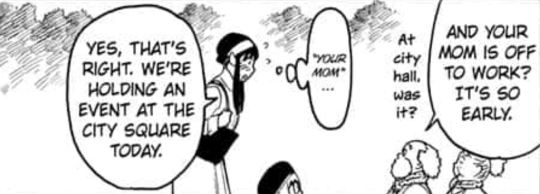
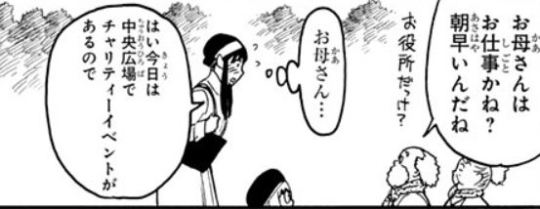
They managed to translate this joke very well; in the JP version, the word "ebento"(event) makes Sigmund think of "obento"(lunchbox). Using the word "function" for "luncheon" was clever!
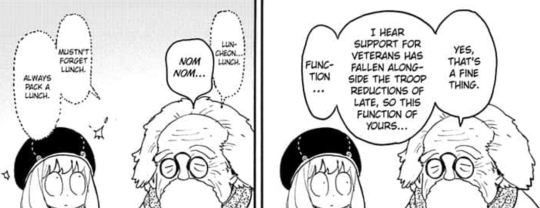
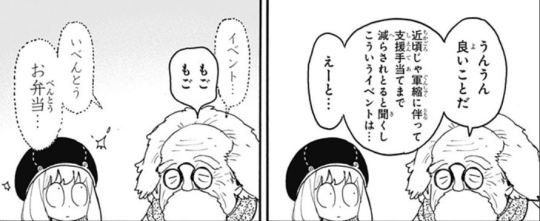
But the main highlight of this chapter for me was seeing the ever enigmatic Melinda again after so long!
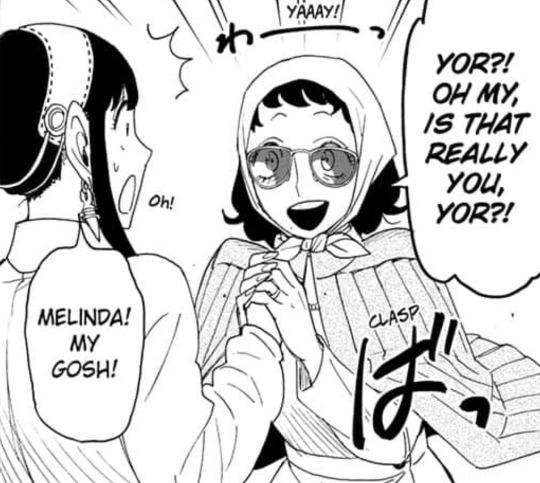
She's a really a tough one to figure out, and this chapter only brought up more questions than answers. She seems extremely nice here, being very forgiving of Millie despite her harsh accusations against her husband. She also mentions that she'd be very resentful if anything were to happen to her family...which is kind of contrasting to her thoughts about Damian from the end of the bus hijacking arc.
I also loved the scene of Yor sticking up for Millie. Her expression was so blank yet so deep at the same time. It actually reminded me of Anya's expression when she punched Damian - in both cases, their blank expression doesn't match their action, but it makes sense because they're still unsure of how to act and what emotion to portray in many seemingly "normal" situations. Anger and annoyance aren't feelings that come naturally to them.
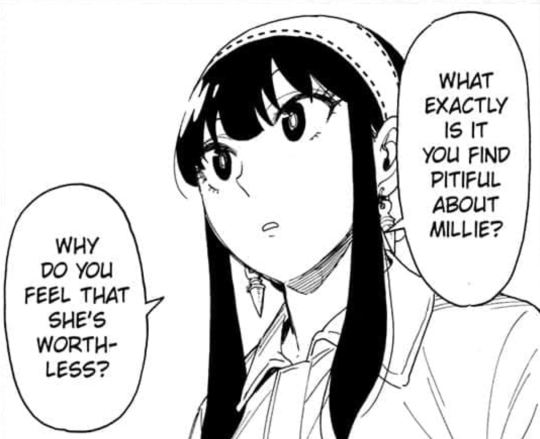
In Yor's case here, having to defend someone against such accusations isn't something she's had much experience doing (at least not for someone who isn't family), and at the same time she can't just outright kill the hostile party like she would on an assassination mission. So despite being in such an awkward situation, especially for someone like her who struggles with social interactions, she managed to remain remarkably calm. As usual, Yor gets easily flustered when it comes to her own feelings, but if she sees someone else being threatened, her capabilities shoot up to maximum! That unpredictable expression should be feared from both her and Twilight!
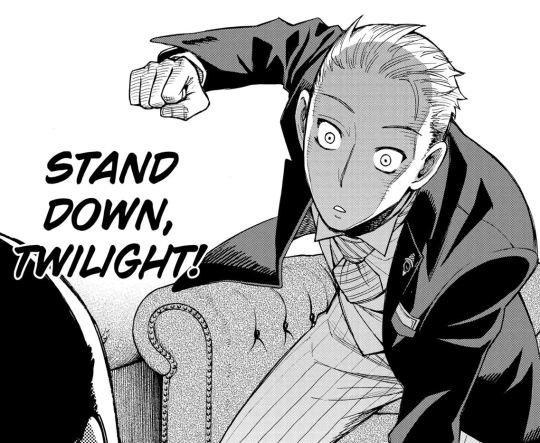
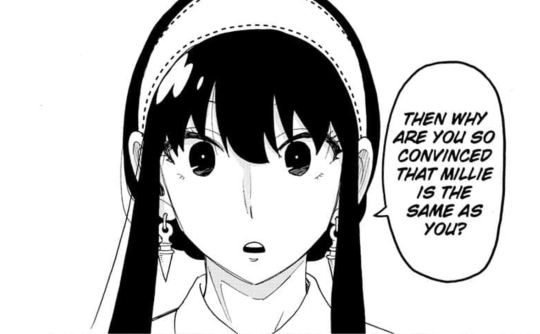
We also learn that Yor lost her parents in the war, which is something I always suspected. Her words in the below panel reminded me a lot of the thoughts she had during the end of the cruise arc. As I've mentioned before, despite her naivety about many things, she understands the tragedies that go on in the world, especially in terms of war - that it's not just soldiers who suffer, but the children and everyone else left behind. It makes sense that someone who understands that kind of loss and hardship has such outpouring empathy to others the way Yor does...
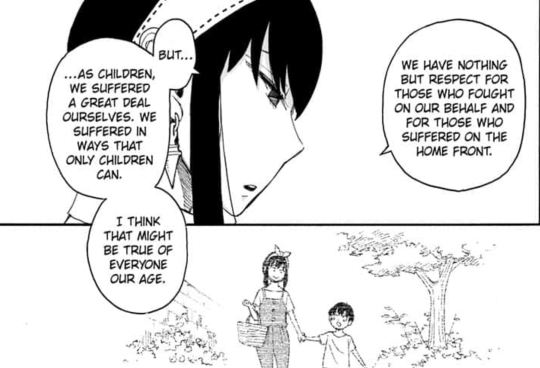
...which is actually contrasting to the way Millie deals with her loss, by lashing out at others. It's said that those who have suffered can become either very sympathetic or very resentful. It was interesting to see that subtle contrast between Yor and Millie here.
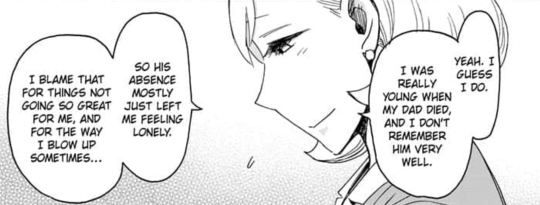
Speaking of Millie, it was nice to see her get some redemption and backstory. Like Camilla, I still don't think this makes up for all the mean things she's said to Yor before, but it's something!
Good to see McMahon again after so long. Don't think he's made an appearance since the cruise arc 👀
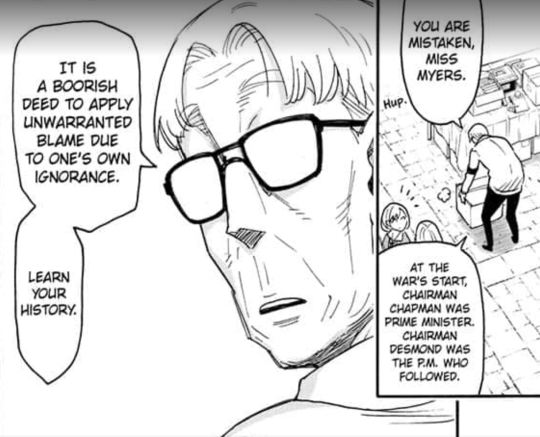
As usual, it's hard to say if this chapter is leading to a new arc or not. I'm sure things mentioned here, especially about Melinda, will come back later, but who knows if it will be right away or several chapters from now. I know we were all expecting something relating to Anya's backstory based on the previous short mission, but I still think there's a chance that what happened here could tie into that. We'll see! We're close to chapter 100 so I wonder if Endo is planning something special for that 🤔
#spy family#spy x family#sxf#spyxfamily#yor forger#sxf manga#sxf manga spoilers#sxf spoilers#melinda desmond
344 notes
·
View notes